Conditional Lagrangian acceleration statistics in turbulent flows with Gaussian distributed
- 格式:pdf
- 大小:254.63 KB
- 文档页数:9
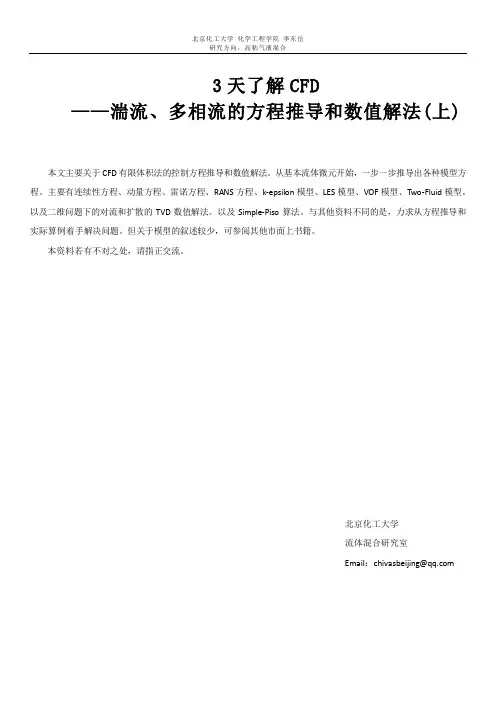
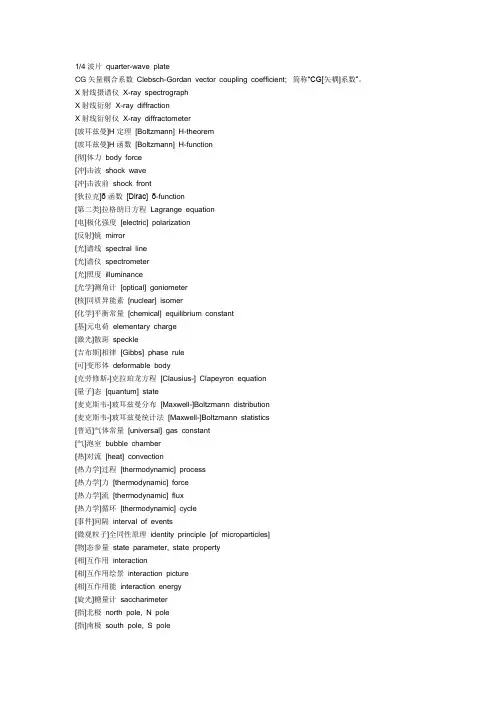
1/4波片quarter-wave plateCG矢量耦合系数Clebsch-Gordan vector coupling coefficient; 简称“CG[矢耦]系数”。
X射线摄谱仪X-ray spectrographX射线衍射X-ray diffractionX射线衍射仪X-ray diffractometer[玻耳兹曼]H定理[Boltzmann] H-theorem[玻耳兹曼]H函数[Boltzmann] H-function[彻]体力body force[冲]击波shock wave[冲]击波前shock front[狄拉克]δ函数[Dirac] δ-function[第二类]拉格朗日方程Lagrange equation[电]极化强度[electric] polarization[反射]镜mirror[光]谱线spectral line[光]谱仪spectrometer[光]照度illuminance[光学]测角计[optical] goniometer[核]同质异能素[nuclear] isomer[化学]平衡常量[chemical] equilibrium constant[基]元电荷elementary charge[激光]散斑speckle[吉布斯]相律[Gibbs] phase rule[可]变形体deformable body[克劳修斯-]克拉珀龙方程[Clausius-] Clapeyron equation[量子]态[quantum] state[麦克斯韦-]玻耳兹曼分布[Maxwell-]Boltzmann distribution[麦克斯韦-]玻耳兹曼统计法[Maxwell-]Boltzmann statistics[普适]气体常量[universal] gas constant[气]泡室bubble chamber[热]对流[heat] convection[热力学]过程[thermodynamic] process[热力学]力[thermodynamic] force[热力学]流[thermodynamic] flux[热力学]循环[thermodynamic] cycle[事件]间隔interval of events[微观粒子]全同性原理identity principle [of microparticles][物]态参量state parameter, state property[相]互作用interaction[相]互作用绘景interaction picture[相]互作用能interaction energy[旋光]糖量计saccharimeter[指]北极north pole, N pole[指]南极south pole, S pole[主]光轴[principal] optical axis[转动]瞬心instantaneous centre [of rotation][转动]瞬轴instantaneous axis [of rotation]t 分布student's t distributiont 检验student's t testK俘获K-captureS矩阵S-matrixWKB近似WKB approximationX射线X-rayΓ空间Γ-spaceα粒子α-particleα射线α-rayα衰变α-decayβ射线β-rayβ衰变β-decayγ矩阵γ-matrixγ射线γ-rayγ衰变γ-decayλ相变λ-transitionμ空间μ-spaceχ 分布chi square distributionχ 检验chi square test阿贝不变量Abbe invariant阿贝成象原理Abbe principle of image formation阿贝折射计Abbe refractometer阿贝正弦条件Abbe sine condition阿伏伽德罗常量Avogadro constant阿伏伽德罗定律Avogadro law阿基米德原理Archimedes principle阿特伍德机Atwood machine艾里斑Airy disk爱因斯坦-斯莫卢霍夫斯基理论Einstein-Smoluchowski theory 爱因斯坦场方程Einstein field equation爱因斯坦等效原理Einstein equivalence principle爱因斯坦关系Einstein relation爱因斯坦求和约定Einstein summation convention爱因斯坦同步Einstein synchronization爱因斯坦系数Einstein coefficient安[培]匝数ampere-turns安培[分子电流]假说Ampere hypothesis安培定律Ampere law安培环路定理Ampere circuital theorem安培计ammeter安培力Ampere force安培天平Ampere balance昂萨格倒易关系Onsager reciprocal relation凹面光栅concave grating凹面镜concave mirror凹透镜concave lens奥温电桥Owen bridge巴比涅补偿器Babinet compensator巴耳末系Balmer series白光white light摆pendulum板极plate伴线satellite line半波片halfwave plate半波损失half-wave loss半波天线half-wave antenna半导体semiconductor半导体激光器semiconductor laser半衰期half life period半透[明]膜semi-transparent film半影penumbra半周期带half-period zone傍轴近似paraxial approximation傍轴区paraxial region傍轴条件paraxial condition薄膜干涉film interference薄膜光学film optics薄透镜thin lens保守力conservative force保守系conservative system饱和saturation饱和磁化强度saturation magnetization本底background本体瞬心迹polhode本影umbra本征函数eigenfunction本征频率eigenfrequency本征矢[量] eigenvector本征振荡eigen oscillation本征振动eigenvibration本征值eigenvalue本征值方程eigenvalue equation比长仪comparator比荷specific charge; 又称“荷质比(charge-mass ratio)”。
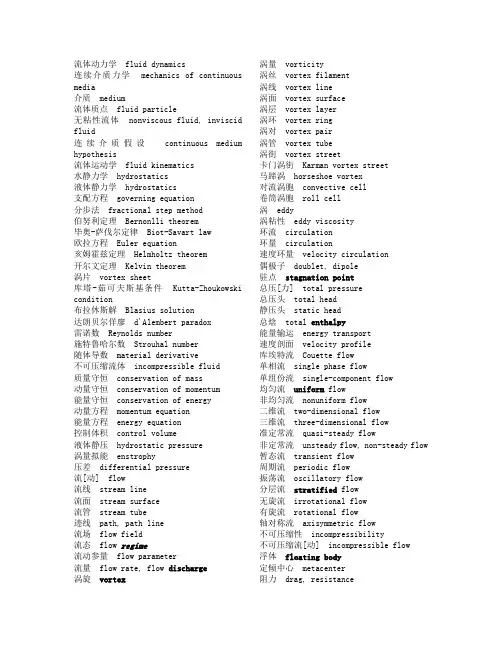
流体动力学 fluid dynamics连续介质力学 mechanics of continuous media介质 medium流体质点 fluid particle无粘性流体 nonviscous fluid, inviscid fluid连续介质假设continuous medium hypothesis流体运动学 fluid kinematics水静力学 hydrostatics液体静力学 hydrostatics支配方程 governing equation分步法 fractional step method伯努利定理 Bernonlli theorem毕奥-萨伐尔定律 Biot-Savart law欧拉方程 Euler equation亥姆霍兹定理 Helmholtz theorem开尔文定理 Kelvin theorem涡片 vortex sheet库塔-茹可夫斯基条件 Kutta-Zhoukowski condition布拉休斯解 Blasius solution达朗贝尔佯廖 d'Alembert paradox雷诺数 Reynolds number施特鲁哈尔数 Strouhal number随体导数 material derivative不可压缩流体 incompressible fluid质量守恒 conservation of mass动量守恒 conservation of momentum能量守恒 conservation of energy动量方程 momentum equation能量方程 energy equation控制体积 control volume液体静压 hydrostatic pressure涡量拟能 enstrophy压差 differential pressure流[动] flow流线 stream line流面 stream surface流管 stream tube迹线 path, path line流场 flow field流态 flow regime流动参量 flow parameter流量 flow rate, flow discharge涡旋vortex 涡量 vorticity涡丝 vortex filament涡线 vortex line涡面 vortex surface涡层 vortex layer涡环 vortex ring涡对 vortex pair涡管 vortex tube涡街 vortex street卡门涡街 Karman vortex street马蹄涡 horseshoe vortex对流涡胞 convective cell卷筒涡胞 roll cell涡 eddy涡粘性 eddy viscosity环流 circulation环量 circulation速度环量 velocity circulation偶极子 doublet, dipole驻点stagnation point总压[力] total pressure总压头 total head静压头 static head总焓 total enthalpy能量输运 energy transport速度剖面 velocity profile库埃特流 Couette flow单相流 single phase flow单组份流 single-component flow均匀流uniform flow非均匀流 nonuniform flow二维流 two-dimensional flow三维流 three-dimensional flow准定常流 quasi-steady flow非定常流 unsteady flow, non-steady flow 暂态流 transient flow周期流 periodic flow振荡流 oscillatory flow分层流 stratified flow无旋流 irrotational flow有旋流 rotational flow轴对称流 axisymmetric flow不可压缩性 incompressibility不可压缩流[动] incompressible flow浮体floating body定倾中心 metacenter阻力 drag, resistance减阻 drag reduction表面力 surface force表面张力 surface tension毛细[管]作用 capillarity来流 incoming flow自由流 free stream自由流线 free stream line外流 external flow进口 entrance, inlet出口 exit, outlet扰动 disturbance, perturbation分布 distribution传播 propagation色散 dispersion弥散 dispersion附加质量 added mass ,associated mass 收缩 contraction镜象法 image method无量纲参数dimensionless parameter几何相似 geometric similarity运动相似 kinematic similarity动力相似[性] dynamic similarity平面流 plane flow势 potential势流 potential flow速度势 velocity potential复势 complex potential复速度 complex velocity流函数 stream function源 source汇 sink速度[水]头 velocity head拐角流 corner flow空泡流 cavity flow超空泡 supercavity超空泡流 supercavity flow空气动力学 aerodynamics低速空气动力学 low-speed aerodynamics 高速空气动力学 high-speed aerodynamics 气动热力学 aerothermodynamics亚声速流[动] subsonic flow跨声速流[动] transonic flow超声速流[动] supersonic flow锥形流 conical flow楔流 wedge flow叶栅流 cascade flow非平衡流[动] non-equilibrium flow 细长体 slender body细长度 slenderness钝头体 bluff body钝体 blunt body翼型 airfoil翼弦 chord薄翼理论 thin-airfoil theory构型 configuration后缘 trailing edge迎角 angle of attack失速 stall脱体激波 detached shock wave波阻 wave drag诱导阻力 induced drag诱导速度 induced velocity临界雷诺数 critical Reynolds number前缘涡 leading edge vortex附着涡 bound vortex约束涡 confined vortex气动中心 aerodynamic center气动力 aerodynamic force气动噪声 aerodynamic noise气动加热 aerodynamic heating离解 dissociation地面效应 ground effect气体动力学 gas dynamics稀疏波 rarefaction wave热状态方程 thermal equation of state 喷管 Nozzle普朗特-迈耶流 Prandtl-Meyer flow瑞利流 Rayleigh flow可压缩流[动] compressible flow可压缩流体 compressible fluid绝热流 adiabatic flow非绝热流 diabatic flow未扰动流 undisturbed flow等熵流 isentropic flow匀熵流 homoentropic flow兰金-于戈尼奥条件Rankine-Hugoniot condition状态方程 equation of state量热状态方程 caloric equation of state 完全气体 perfect gas拉瓦尔喷管 Laval nozzle马赫角 Mach angle马赫锥 Mach cone马赫线 Mach line马赫数 Mach number马赫波 Mach wave当地马赫数 local Mach number冲击波shock wave激波 shock wave正激波 normal shock wave斜激波 oblique shock wave头波 bow wave附体激波 attached shock wave激波阵面 shock front激波层 shock layer压缩波 compression wave反射 reflection折射 refraction散射 scattering衍射 diffraction绕射 diffraction出口压力 exit pressure超压[强] over pressure反压 back pressure爆炸 explosion爆轰 detonation缓燃 deflagration水动力学 hydrodynamics液体动力学 hydrodynamics泰勒不稳定性 Taylor instability 盖斯特纳波 Gerstner wave斯托克斯波 Stokes wave瑞利数 Rayleigh number自由面 free surface波速 wave speed, wave velocity 波高 wave height波列 wave train波群 wave group波能 wave energy表面波 surface wave表面张力波 capillary wave规则波 regular wave不规则波 irregular wave浅水波 shallow water wave深水波 deep water wave重力波 gravity wave椭圆余弦波 cnoidal wave潮波 tidal wave涌波 surge wave破碎波 breaking wave船波 ship wave 非线性波 nonlinear wave孤立子 soliton水动[力]噪声 hydrodynamic noise水击 water hammer空化 cavitation空化数 cavitation number空蚀 cavitation damage超空化流 supercavitating flow水翼 hydrofoil水力学 hydraulics洪水波 flood wave涟漪 ripple消能 energy dissipation海洋水动力学 marine hydrodynamics谢齐公式 Chezy formula欧拉数 Euler number弗劳德数 Froude number水力半径 hydraulic radius水力坡度 hvdraulic slope高度水头 elevating head水头损失 head loss水位 water level水跃 hydraulic jump含水层 aquifer排水 drainage排放量 discharge壅水曲线 back water curve压[强水]头 pressure head过水断面 flow cross-section明槽流 open channel flow孔流 orifice flow无压流 free surface flow有压流 pressure flow缓流 subcritical flow急流 supercritical flow渐变流 gradually varied flow急变流 rapidly varied flow临界流 critical flow异重流 density current, gravity flow 堰流 weir flow掺气流 aerated flow含沙流 sediment-laden stream降水曲线 dropdown curve沉积物 sediment, deposit沉[降堆]积 sedimentation, deposition 沉降速度 settling velocity流动稳定性 flow stability不稳定性 instability奥尔-索末菲方程Orr-Sommerfeld equation涡量方程 vorticity equation泊肃叶流 Poiseuille flow奥辛流 Oseen flow剪切流 shear flow粘性流[动] viscous flow层流 laminar flow分离流 separated flow二次流 secondary flow近场流 near field flow远场流 far field flow滞止流 stagnation flow尾流 wake [flow]回流 back flow反流 reverse flow射流 jet自由射流 free jet管流 pipe flow, tube flow内流 internal flow拟序结构 coherent structure猝发过程 bursting process表观粘度 apparent viscosity运动粘性 kinematic viscosity动力粘性 dynamic viscosity泊 poise厘泊 centipoise厘沱 centistoke剪切层 shear layer次层 sublayer流动分离 flow separation层流分离 laminar separation湍流分离 turbulent separation分离点 separation point附着点 attachment point再附 reattachment再层流化 relaminarization起动涡 starting vortex驻涡 standing vortex涡旋破碎 vortex breakdown涡旋脱落 vortex shedding压[力]降 pressure drop压差阻力 pressure drag压力能 pressure energy型阻 profile drag滑移速度 slip velocity 无滑移条件 non-slip condition壁剪应力 skin friction, frictional drag 壁剪切速度 friction velocity磨擦损失 friction loss磨擦因子 friction factor耗散 dissipation滞后 lag相似性解 similar solution局域相似 local similarity气体润滑 gas lubrication液体动力润滑 hydrodynamic lubrication 浆体 slurry泰勒数 Taylor number纳维-斯托克斯方程Navier-Stokes equation牛顿流体 Newtonian fluid边界层理论 boundary later theory边界层方程 boundary layer equation边界层 boundary layer附面层 boundary layer层流边界层 laminar boundary layer湍流边界层 turbulent boundary layer温度边界层 thermal boundary layer边界层转捩 boundary layer transition 边界层分离 boundary layer separation 边界层厚度 boundary layer thickness位移厚度 displacement thickness动量厚度 momentum thickness能量厚度 energy thickness焓厚度 enthalpy thickness注入 injection吸出 suction泰勒涡 Taylor vortex速度亏损律 velocity defect law形状因子 shape factor测速法 anemometry粘度测定法 visco[si] metry流动显示 flow visualization油烟显示 oil smoke visualization孔板流量计 orifice meter频率响应 frequency response油膜显示 oil film visualization阴影法 shadow method纹影法 schlieren method烟丝法 smoke wire method丝线法 tuft method氢泡法 nydrogen bubble method相似理论 similarity theory相似律 similarity law部分相似 partial similarity定理 pi theorem, Buckingham theorem 静[态]校准 static calibration动态校准 dynamic calibration风洞 wind tunnel激波管 shock tube激波管风洞 shock tube wind tunnel水洞 water tunnel拖曳水池 towing tank旋臂水池 rotating arm basin扩散段 diffuser测压孔 pressure tap皮托管 pitot tube普雷斯顿管 preston tube斯坦顿管 Stanton tube文丘里管 Venturi tubeU形管 U-tube压强计 manometer微压计 micromanometer多管压强计 multiple manometer静压管 static [pressure]tube流速计 anemometer风速管 Pitot- static tube激光多普勒测速计laser Doppler anemometer,laser Doppler velocimeter热线流速计 hot-wire anemometer热膜流速计 hot- film anemometer流量计 flow meter粘度计 visco[si] meter涡量计 vorticity meter传感器 transducer, sensor压强传感器 pressure transducer热敏电阻 thermistor示踪物 tracer时间线 time line脉线 streak line尺度效应 scale effect壁效应 wall effect堵塞 blockage堵寒效应 blockage effect动态响应 dynamic response响应频率 response frequency底压 base pressure 菲克定律 Fick law巴塞特力 Basset force埃克特数 Eckert number格拉斯霍夫数 Grashof number努塞特数 Nusselt number普朗特数 prandtl number雷诺比拟 Reynolds analogy施密特数 schmidt number斯坦顿数 Stanton number对流 convection自由对流natural convection, free convec-tion强迫对流 forced convection热对流 heat convection质量传递 mass transfer传质系数 mass transfer coefficient热量传递 heat transfer传热系数 heat transfer coefficient对流传热 convective heat transfer辐射传热 radiative heat transfer动量交换 momentum transfer能量传递 energy transfer传导 conduction热传导 conductive heat transfer热交换 heat exchange临界热通量 critical heat flux浓度 concentration扩散 diffusion扩散性 diffusivity扩散率 diffusivity扩散速度 diffusion velocity分子扩散 molecular diffusion沸腾 boiling蒸发 evaporation气化 gasification凝结 condensation成核 nucleation计算流体力学computational fluid mechanics多重尺度问题 multiple scale problem伯格斯方程 Burgers equation对流扩散方程convection diffusion equationKDU方程 KDV equation修正微分方程modified differential equation拉克斯等价定理 Lax equivalence theorem数值模拟 numerical simulation大涡模拟 large eddy simulation数值粘性 numerical viscosity非线性不稳定性 nonlinear instability希尔特稳定性分析Hirt stability analysis相容条件 consistency conditionCFL条件Courant- Friedrichs- Lewy condition ,CFL condition狄里克雷边界条件Dirichlet boundarycondition熵条件 entropy condition远场边界条件far field boundary condition流入边界条件 inflow boundary condition 无反射边界条件nonreflecting boundary condition数值边界条件numerical boundary condition流出边界条件 outflow boundary condition 冯.诺伊曼条件 von Neumann condition近似因子分解法approximate factorization method人工压缩 artificial compression人工粘性 artificial viscosity边界元法 boundary element method配置方法 collocation method能量法 energy method有限体积法 finite volume method流体网格法 fluid in cell method, FLIC method通量校正传输法flux-corrected transport method通量矢量分解法 flux vector splitting method伽辽金法 Galerkin method积分方法 integral method标记网格法 marker and cell method, MAC method特征线法 method of characteristics直线法 method of lines矩量法 moment method多重网格法 multi- grid method板块法 panel method质点网格法particle in cell method, PIC method质点法 particle method 预估校正法 predictor-corrector method 投影法 projection method准谱法 pseudo-spectral method随机选取法 random choice method激波捕捉法 shock-capturing method激波拟合法 shock-fitting method谱方法 spectral method稀疏矩阵分解法 split coefficient matrix method不定常法 time-dependent method时间分步法 time splitting method变分法 variational method涡方法 vortex method隐格式 implicit scheme显格式 explicit scheme交替方向隐格式 alternating direction implicit scheme, ADI scheme反扩散差分格式anti-diffusion difference scheme紧差分格式 compact difference scheme 守恒差分格式 conservation difference scheme克兰克-尼科尔森格式Crank-Nicolson scheme杜福特-弗兰克尔格式Dufort-Frankel scheme指数格式 exponential scheme戈本诺夫格式 Godunov scheme高分辨率格式 high resolution scheme拉克斯-温德罗夫格式Lax-Wendroff scheme蛙跳格式 leap-frog scheme单调差分格式 monotone difference scheme 保单调差分格式 monotonicity preserving diffe-rence scheme穆曼-科尔格式 Murman-Cole scheme半隐格式 semi-implicit scheme斜迎风格式 skew-upstream scheme全变差下降格式total variation decreasing scheme TVD scheme迎风格式upstream scheme , upwind scheme计算区域 computational domain物理区域 physical domain影响域 domain of influence依赖域 domain of dependence区域分解 domain decomposition维数分解 dimensional split物理解 physical solution弱解 weak solution黎曼解算子 Riemann solver守恒型 conservation form弱守恒型 weak conservation form强守恒型 strong conservation form散度型 divergence form贴体曲线坐标 body- fitted curvilinear coordi-nates[自]适应网格 [self-] adaptive mesh适应网格生成 adaptive grid generation 自动网格生成 automatic grid generation 数值网格生成 numerical grid generation 交错网格 staggered mesh网格雷诺数 cell Reynolds number数植扩散 numerical diffusion数值耗散 numerical dissipation数值色散 numerical dispersion数值通量 numerical flux放大因子 amplification factor放大矩阵 amplification matrix阻尼误差 damping error离散涡 discrete vortex熵通量 entropy flux熵函数 entropy function伯努利方程 Bernoulli equation。
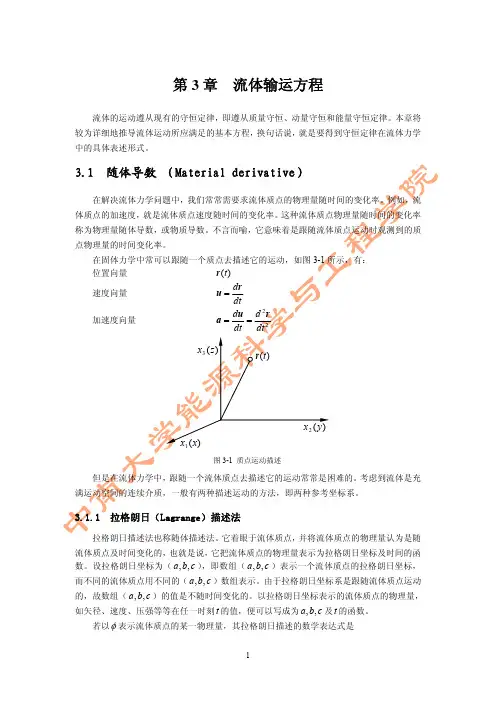
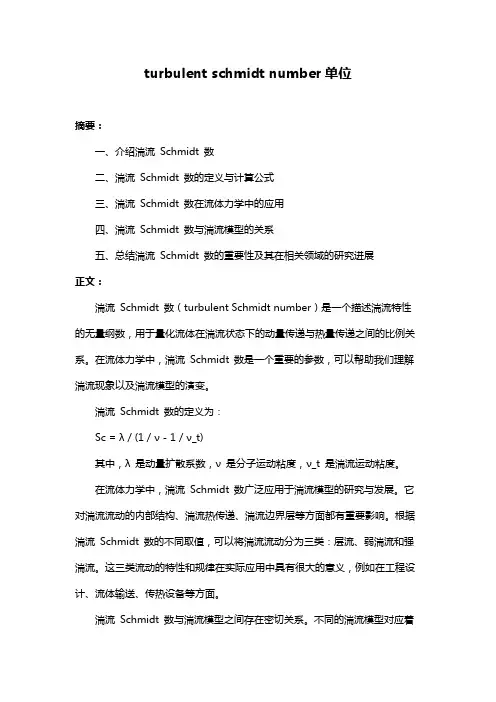
turbulent schmidt number单位摘要:一、介绍湍流Schmidt 数二、湍流Schmidt 数的定义与计算公式三、湍流Schmidt 数在流体力学中的应用四、湍流Schmidt 数与湍流模型的关系五、总结湍流Schmidt 数的重要性及其在相关领域的研究进展正文:湍流Schmidt 数(turbulent Schmidt number)是一个描述湍流特性的无量纲数,用于量化流体在湍流状态下的动量传递与热量传递之间的比例关系。
在流体力学中,湍流Schmidt 数是一个重要的参数,可以帮助我们理解湍流现象以及湍流模型的演变。
湍流Schmidt 数的定义为:Sc = λ / (1 / ν - 1 / ν_t)其中,λ是动量扩散系数,ν 是分子运动粘度,ν_t 是湍流运动粘度。
在流体力学中,湍流Schmidt 数广泛应用于湍流模型的研究与发展。
它对湍流流动的内部结构、湍流热传递、湍流边界层等方面都有重要影响。
根据湍流Schmidt 数的不同取值,可以将湍流流动分为三类:层流、弱湍流和强湍流。
这三类流动的特性和规律在实际应用中具有很大的意义,例如在工程设计、流体输送、传热设备等方面。
湍流Schmidt 数与湍流模型之间存在密切关系。
不同的湍流模型对应着不同的Schmidt 数取值。
例如,大涡模拟(LES)对应的Schmidt 数通常在0.2-0.4 之间,而直接数值模拟(DNS)则需要更大的Schmidt 数(通常在0.8-1.0 之间)。
因此,在选择湍流模型时,需要充分考虑湍流Schmidt 数的合理取值范围,以保证模型的准确性和适用性。
总之,湍流Schmidt 数在流体力学领域具有重要的理论和实际意义。
对于研究人员和工程师来说,了解和研究湍流Schmidt 数有助于更好地把握湍流流动的特性和规律,为解决实际工程问题提供有力支持。
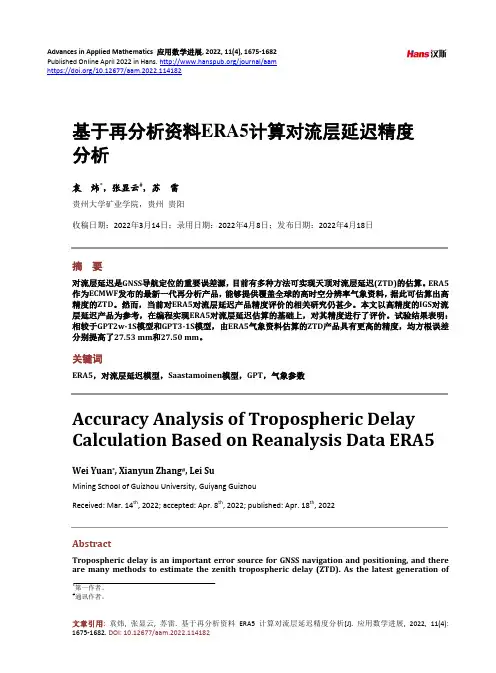
Advances in Applied Mathematics 应用数学进展, 2022, 11(4), 1675-1682Published Online April 2022 in Hans. /journal/aamhttps:///10.12677/aam.2022.114182基于再分析资料ERA5计算对流层延迟精度分析袁炜*,张显云#,苏雷贵州大学矿业学院,贵州贵阳收稿日期:2022年3月14日;录用日期:2022年4月8日;发布日期:2022年4月18日摘要对流层延迟是GNSS导航定位的重要误差源,目前有多种方法可实现天顶对流层延迟(ZTD)的估算。
ERA5作为ECMWF发布的最新一代再分析产品,能够提供覆盖全球的高时空分辨率气象资料,据此可估算出高精度的ZTD。
然而,当前对ERA5对流层延迟产品精度评价的相关研究仍甚少。
本文以高精度的IGS对流层延迟产品为参考,在编程实现ERA5对流层延迟估算的基础上,对其精度进行了评价。
试验结果表明:相较于GPT2w-1S模型和GPT3-1S模型,由ERA5气象资料估算的ZTD产品具有更高的精度,均方根误差分别提高了27.53 mm和27.50 mm。
关键词ERA5,对流层延迟模型,Saastamoinen模型,GPT,气象参数Accuracy Analysis of Tropospheric DelayCalculation Based on Reanalysis Data ERA5Wei Yuan*, Xianyun Zhang#, Lei SuMining School of Guizhou University, Guiyang GuizhouReceived: Mar. 14th, 2022; accepted: Apr. 8th, 2022; published: Apr. 18th, 2022AbstractTropospheric delay is an important error source for GNSS navigation and positioning, and there are many methods to estimate the zenith tropospheric delay (ZTD). As the latest generation of*第一作者。
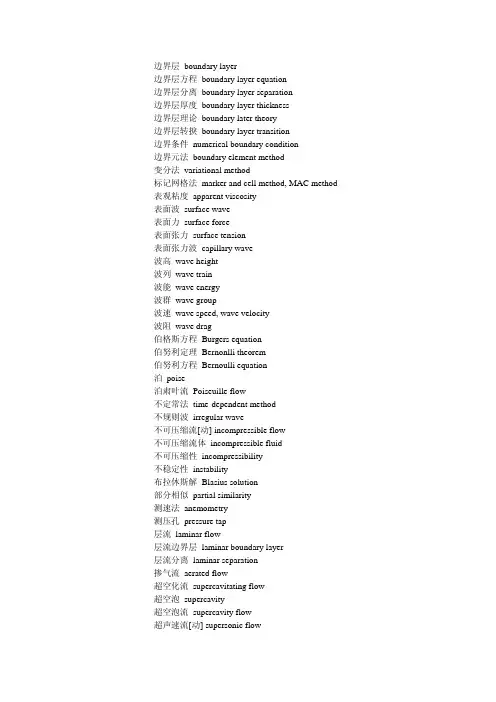
边界层 boundary layer边界层方程boundary layer equation边界层分离boundary layer separation边界层厚度boundary layer thickness边界层理论boundary later theory边界层转捩boundary layer transition边界条件numerical boundary condition边界元法 boundary element method变分法 variational method标记网格法marker and cell method, MAC method 表观粘度 apparent viscosity表面波 surface wave表面力 surface force表面张力 surface tension表面张力波 capillary wave波高 wave height波列 wave train波能 wave energy波群 wave group波速wave speed, wave velocity波阻 wave drag伯格斯方程 Burgers equation伯努利定理 Bernonlli theorem伯努利方程 Bernoulli equation泊 poise泊肃叶流 Poiseuille flow不定常法 time-dependent method不规则波 irregular wave不可压缩流[动] incompressible flow不可压缩流体 incompressible fluid不可压缩性 incompressibility不稳定性 instability布拉休斯解 Blasius solution部分相似 partial similarity测速法 anemometry测压孔 pressure tap层流 laminar flow层流边界层laminar boundary layer层流分离 laminar separation掺气流 aerated flow超空化流 supercavitating flow超空泡 supercavity超空泡流 supercavity flow超声速流[动] supersonic flow超压[强] over pressure潮波 tidal wave沉[降堆]积 sedimentation, deposition沉积物 sediment, deposit沉降速度 settling velocity成核 nucleation尺度效应 scale effect冲击波 shock wave出口 exit, outlet出口压力 exit pressure传播 propagation传导 conduction传感器 transducer, sensor传热系数 heat transfer coefficient传质系数mass transfer coefficient船波 ship wave次层 sublayer达朗贝尔佯廖 d'Alembert paradox大涡模拟 large eddy simulation单调差分格式monotone difference scheme单相流single phase flow单组份流 single-component flow当地马赫数 local Mach number等熵流 isentropic flow低速空气动力学 low-speed aerodynamics狄里克雷边界条件Dirichlet boundary condition 底压 base pressure地面效应 ground effect定理pi theorem, Buckingham theorem定倾中心 metacenter动力相似[性] dynamic similarity动力粘性 dynamic viscosity动量方程 momentum equation动量厚度 momentum thickness动量交换 momentum transfer动量守恒 conservation of momentum动态响应 dynamic response动态校准 dynamic calibration堵寒效应 blockage effect堵塞 blockage杜福特-弗兰克尔格式 Dufort-Frankel scheme 对流 convection对流传热convective heat transfer对流扩散方程convection diffusion equation对流涡胞 convective cell钝体 blunt body钝头体 bluff body多管压强计 multiple manometer多重尺度问题 multiple scale problem多重网格法multi- grid method二次流 secondary flow二维流 two-dimensional flow反扩散差分格式 anti-diffusion difference scheme 反流 reverse flow反射 reflection反压 back pressure放大矩阵 amplification matrix放大因子 amplification factor菲克定律 Fick law非定常流unsteady flow, non-steady flow非绝热流 diabatic flow非均匀流 nonuniform flow非平衡流[动] non-equilibrium flow非线性波 nonlinear wave非线性不稳定性 nonlinear instability沸腾 boiling分布 distribution分步法 fractional step method分层流 stratified flow分离点 separation point分离流 separated flow分子扩散 molecular diffusion风洞 wind tunnel风速管Pitot- static tube冯.诺伊曼条件von Neumann condition辐射传热 radiative heat transfer浮体 floating body弗劳德数 Froude number复势 complex potential复速度 complex velocity附加质量added mass ,associated mass附面层 boundary layer附体激波attached shock wave附着点 attachment point附着涡 bound vortex盖斯特纳波 Gerstner wave高度水头 elevating head高分辨率格式high resolution scheme高速空气动力学 high-speed aerodynamics戈本诺夫格式 Godunov scheme格拉斯霍夫数 Grashof number构型 configuration孤立子 soliton拐角流 corner flow管流pipe flow, tube flow规则波 regular wave过水断面 flow cross-section海洋水动力学 marine hydrodynamics亥姆霍兹定理 Helmholtz theorem含沙流 sediment-laden stream含水层 aquifer耗散 dissipation洪水波 flood wave后缘 trailing edge滑移速度 slip velocity环量 circulation环流 circulation缓流 subcritical flow缓燃 deflagration回流 back flow汇 sink积分方法 integral method迹线path, path line激波 shock wave激波捕捉法 shock-capturing method激波层 shock layer激波管 shock tube激波管风洞shock tube wind tunnel激波拟合法 shock-fitting method激波阵面 shock front激光多普勒测速计 laser Doppler anemometer, laser Doppler velocimeter 急变流 rapidly varied flow急流 supercritical flow几何相似 geometric similarity计算流体力学computational fluid mechanics计算区域 computational domain剪切层 shear layer剪切流 shear flow减阻 drag reduction渐变流 gradually varied flow浆体 slurry降水曲线 dropdown curve交错网格 staggered mesh交替方向隐格式alternating direction implicit scheme, ADI scheme 介质 medium紧差分格式compact difference scheme进口 entrance, inlet近场流 near field flow近似因子分解法approximate factorization method静[态]校准 static calibration静压管 static [pressure]tube静压头 static head镜象法 image method局域相似 local similarity矩量法 moment method卷筒涡胞 roll cell绝热流 adiabatic flow均匀流 uniform flow卡门涡街Karman vortex street开尔文定理 Kelvin theorem可压缩流[动] compressible flow可压缩流体 compressible fluid克兰克-尼科尔森格式 Crank-Nicolson scheme空化 cavitation空化数 cavitation number空泡流 cavity flow空气动力学 aerodynamics空蚀 cavitation damage孔板流量计 orifice meter孔流 orifice flow控制体积 control volume库埃特流 Couette flow库塔-茹可夫斯基条件 Kutta-Zhoukowski condition跨声速流[动] transonic flow扩散 diffusion扩散段 diffuser扩散率 diffusivity扩散速度 diffusion velocity扩散性 diffusivity拉克斯-温德罗夫格式 Lax-Wendroff scheme拉克斯等价定理 Lax equivalence theorem拉瓦尔喷管 Laval nozzle来流 incoming flow兰金-于戈尼奥条件 Rankine-Hugoniot condition雷诺比拟 Reynolds analogy雷诺数 Reynolds number厘泊 centipoise厘沱 centistoke黎曼解算子 Riemann solver离解 dissociation离散涡 discrete vortex连续介质假设continuous medium hypothesis 连续介质力学mechanics of continuous media 涟漪 ripple量热状态方程caloric equation of state临界雷诺数 critical Reynolds number临界流 critical flow临界热通量critical heat flux流[动] flow流场 flow field流出边界条件outflow boundary condition流动参量 flow parameter流动分离 flow separation流动稳定性 flow stability流动显示 flow visualization流管 stream tube流函数 stream function流量flow rate, flow discharge流量计 flow meter流面 stream surface流入边界条件inflow boundary condition流速计 anemometer流态 flow regime流体动力学 fluid dynamics流体网格法fluid in cell method, FLIC method 流体运动学 fluid kinematics流体质点 fluid particle流线 stream line马赫波 Mach wave马赫角 Mach angle马赫数 Mach number马赫线 Mach line马赫锥 Mach cone马蹄涡 horseshoe vortex脉线 streak line毛细[管]作用 capillarity弥散 dispersion明槽流open channel flow磨擦损失 friction loss磨擦因子 friction factor穆曼-科尔格式 Murman-Cole scheme纳维-斯托克斯方程 Navier-Stokes equation 内流 internal flow能量传递 energy transfer能量法 energy method能量方程 energy equation能量厚度 energy thickness能量守恒 conservation of energy能量输运 energy transport拟序结构 coherent structure凝结 condensation牛顿流体 Newtonian fluid浓度 concentration努塞特数 Nusselt number欧拉方程 Euler equation欧拉数 Euler number偶极子 doublet, dipole排放量 discharge排水 drainage配置方法 collocation method喷管 Nozzle皮托管 pitot tube频率响应 frequency response平面流 plane flow破碎波 breaking wave普朗特-迈耶流 Prandtl-Meyer flow普朗特数 prandtl number普雷斯顿管 preston tube谱方法 spectral method起动涡 starting vortex气动加热 aerodynamic heating气动力 aerodynamic force气动热力学 aerothermodynamics气动噪声 aerodynamic noise气动中心 aerodynamic center气化 gasification气体动力学 gas dynamics气体润滑 gas lubrication前缘涡 leading edge vortex浅水波shallow water wave强迫对流 forced convection强守恒型 strong conservation form氢泡法 nydrogen bubble method区域分解 domain decomposition全变差下降格式total variation decreasing scheme TVD scheme 扰动 disturbance, perturbation绕射 diffraction热传导 conductive heat transfer热对流 heat convection热交换 heat exchange热量传递 heat transfer热敏电阻 thermistor热膜流速计hot- film anemometer热线流速计 hot-wire anemometer热状态方程thermal equation of state人工压缩 artificial compression人工粘性 artificial viscosity瑞利流 Rayleigh flow瑞利数 Rayleigh number弱解 weak solution弱守恒型weak conservation form三维流 three-dimensional flow散度型 divergence form散射 scattering色散 dispersion射流 jet深水波deep water wave失速 stall施密特数 schmidt number施特鲁哈尔数 Strouhal number时间分步法 time splitting method时间线 time line示踪物 tracer势 potential势流 potential flow适应网格生成 adaptive grid generation收缩 contraction守恒差分格式 conservation difference scheme守恒型 conservation form数植扩散 numerical diffusion数值耗散 numerical dissipation数值模拟 numerical simulation数值色散 numerical dispersion数值通量 numerical flux数值网格生成numerical grid generation数值粘性 numerical viscosity水动[力]噪声 hydrodynamic noise水动力学 hydrodynamics水洞 water tunnel水击 water hammer水静力学 hydrostatics水力半径 hydraulic radius水力坡度 hvdraulic slope水力学 hydraulics水头损失 head loss水位 water level水翼 hydrofoil水跃 hydraulic jump斯坦顿管 Stanton tube斯坦顿数 Stanton number斯托克斯波 Stokes wave丝线法 tuft method速度[水]头 velocity head速度环量 velocity circulation速度亏损律 velocity defect law速度剖面 velocity profile速度势 velocity potential随机选取法random choice method随体导数 material derivative泰勒不稳定性 Taylor instability泰勒数 Taylor number泰勒涡 Taylor vortex特征线法 method of characteristics贴体曲线坐标body- fitted curvilinear coordi-nates通量矢量分解法flux vector splitting method通量校正传输法 flux-corrected transport method 投影法 projection method头波 bow wave湍流边界层turbulent boundary layer湍流分离 turbulent separation拖曳水池 towing tank脱体激波detached shock wave椭圆余弦波 cnoidal wave蛙跳格式 leap-frog scheme外流 external flow完全气体 perfect gas网格雷诺数cell Reynolds number微压计 micromanometer维数分解 dimensional split尾流 wake [flow]未扰动流 undisturbed flow位移厚度 displacement thickness温度边界层thermal boundary layer文丘里管 Venturi tube纹影法 schlieren method涡 eddy涡层 vortex layer涡对 vortex pair涡方法 vortex method涡管 vortex tube涡环 vortex ring涡街 vortex street涡量 vorticity涡量方程 vorticity equation涡量计 vorticity meter涡量拟能 enstrophy涡面 vortex surface涡片 vortex sheet涡丝 vortex filament涡线 vortex line涡旋 vortex涡旋破碎 vortex breakdown涡旋脱落 vortex shedding涡粘性 eddy viscosity无反射边界条件nonreflecting boundary condition 无滑移条件 non-slip condition无量纲参数 dimensionless parameter无旋流 irrotational flow无压流free surface flow无粘性流体nonviscous fluid, inviscid fluid物理解 physical solution物理区域 physical domain吸出 suction稀疏波 rarefaction wave稀疏矩阵分解法split coefficient matrix method希尔特稳定性分析Hirt stability analysis细长度 slenderness细长体 slender body显格式 explicit scheme相容条件 consistency condition相似理论 similarity theory相似律 similarity law相似性解 similar solution响应频率 response frequency消能 energy dissipation楔流 wedge flow斜激波oblique shock wave斜迎风格式 skew-upstream scheme谢齐公式 Chezy formula型阻 profile drag形状因子 shape factor修正微分方程 modified differential equation 旋臂水池rotating arm basin压[力]降 pressure drop压[强水]头 pressure head压差 differential pressure压差阻力 pressure drag压力能 pressure energy压强传感器 pressure transducer压强计 manometer压缩波 compression wave亚声速流[动] subsonic flow烟丝法 smoke wire method衍射 diffraction堰流 weir flow叶栅流 cascade flow液体动力润滑 hydrodynamic lubrication液体动力学 hydrodynamics液体静力学 hydrostatics液体静压 hydrostatic pressure依赖域 domain of dependence异重流density current, gravity flow翼弦 chord翼型 airfoil阴影法 shadow method隐格式 implicit scheme迎风格式upstream scheme , upwind scheme 迎角 angle of attack影响域 domain of influence涌波 surge wave油膜显示oil film visualization油烟显示 oil smoke visualization有限体积法 finite volume method有旋流 rotational flow有压流 pressure flow诱导速度 induced velocity诱导阻力 induced drag预估校正法 predictor-corrector method源 source远场边界条件far field boundary condition远场流far field flow约束涡 confined vortex匀熵流 homoentropic flow运动相似 kinematic similarity运动粘性 kinematic viscosity再层流化 relaminarization再附 reattachment暂态流 transient flow粘度测定法 visco[si] metry粘度计 visco[si] meter粘性流[动] viscous flow折射 refraction振荡流 oscillatory flow蒸发 evaporation正激波normal shock wave支配方程 governing equation直线法 method of lines指数格式 exponential scheme质点法 particle method质点网格法particle in cell method, PIC method 质量传递 mass transfer质量守恒 conservation of mass滞后 lag滞止流 stagnation flow重力波 gravity wave周期流 periodic flow轴对称流 axisymmetric flow注入 injection驻点 stagnation point驻涡 standing vortex状态方程equation of state锥形流 conical flow准定常流 quasi-steady flow准谱法 pseudo-spectral method自动网格生成automatic grid generation自由对流natural convection, free convec-tion 自由流 free stream自由流线free stream line自由面 free surface自由射流 free jet总压[力] total pressure总压头 total head总焓 total enthalpy阻力 drag, resistance阻尼误差 damping error伽辽金法 Galerkin method壅水曲线back water curve猝发过程 bursting process焓厚度 enthalpy thickness熵函数 entropy function熵条件 entropy condition熵通量 entropy flux[自]适应网格 [self-] adaptive meshCFL条件Courant- Friedrichs- Lewy condition ,CFL condition KDU方程 KDV equationU形管 U-tube埃克特数 Eckert number奥尔-索末菲方程 Orr-Sommerfeld equation奥辛流 Oseen flow巴塞特力 Basset force板块法 panel method半隐格式 semi-implicit scheme薄翼理论 thin-airfoil theory保单调差分格式monotonicity preserving diffe-rence scheme 爆轰 detonation爆炸 explosion毕奥-萨伐尔定律 Biot-Savart law壁剪切速度 friction velocity壁剪应力 skin friction, frictional drag壁效应 wall effect。
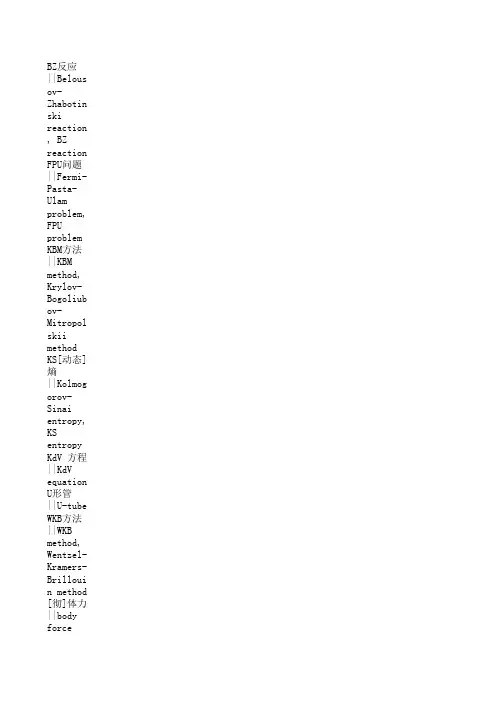
BZ反应||Belousov-Zhabotinski reaction, BZ reactionFPU问题||Fermi-Pasta-Ulam problem, FPU problemKBM方法||KBM method, Krylov-Bogoliubov-Mitropolskii method KS[动态]熵||Kolmogorov-Sinai entropy, KS entropyKdV 方程||KdV equationU形管||U-tubeWKB方法||WKB method, Wentzel-Kramers-Brillouin method[彻]体力||body force[单]元||element[第二类]拉格朗日方程||Lagrange equation [of the second kind] [叠栅]云纹||moiré fringe; 物理学称“叠栅条纹”。
[叠栅]云纹法||moiré method[抗]剪切角||angle of shear resistance[可]变形体||deformable body[钱]币状裂纹||penny-shape crack[映]象||image[圆]筒||cylinder[圆]柱壳||cylindrical shell[转]轴||shaft[转动]瞬心||instantaneous center [of rotation][转动]瞬轴||instantaneous axis [of rotation][状]态变量||state variable[状]态空间||state space[自]适应网格||[self-]adaptive meshC0连续问题||C0-continuous problemC1连续问题||C1-continuous problemCFL条件||Courant-Friedrichs-Lewy condition, CFL condition HRR场||Hutchinson-Rice-Rosengren fieldJ积分||J-integralJ阻力曲线||J-resistance curveKAM定理||Kolgomorov-Arnol'd-Moser theorem, KAM theoremKAM环面||KAM torush收敛||h-convergencep收敛||p-convergenceπ定理||Buckingham theorem, pi theorem阿尔曼西应变||Almansis strain阿尔文波||Alfven wave阿基米德原理||Archimedes principle阿诺德舌[头]||Arnol'd tongue阿佩尔方程||Appel equation阿特伍德机||Atwood machine埃克曼边界层||Ekman boundary layer埃克曼流||Ekman flow埃克曼数||Ekman number埃克特数||Eckert number埃农吸引子||Henon attractor艾里应力函数||Airy stress function鞍点||saddle [point]鞍结分岔||saddle-node bifurcation安定[性]理论||shake-down theory安全寿命||safe life安全系数||safety factor安全裕度||safety margin暗条纹||dark fringe奥尔-索末菲方程||Orr-Sommerfeld equation奥辛流||Oseen flow奥伊洛特模型||Oldroyd model八面体剪应变||octohedral shear strain八面体剪应力||octohedral shear stress八面体剪应力理论||octohedral shear stress theory巴塞特力||Basset force白光散斑法||white-light speckle method摆||pendulum摆振||shimmy板||plate板块法||panel method板元||plate element半导体应变计||semiconductor strain gage半峰宽度||half-peak width半解析法||semi-analytical method半逆解法||semi-inverse method半频进动||half frequency precession半向同性张量||hemitropic tensor半隐格式||semi-implicit scheme薄壁杆||thin-walled bar薄壁梁||thin-walled beam薄壁筒||thin-walled cylinder薄膜比拟||membrane analogy薄翼理论||thin-airfoil theory保单调差分格式||monotonicity preserving difference scheme 保守力||conservative force保守系||conservative system爆发||blow up爆高||height of burst爆轰||detonation; 又称“爆震”。
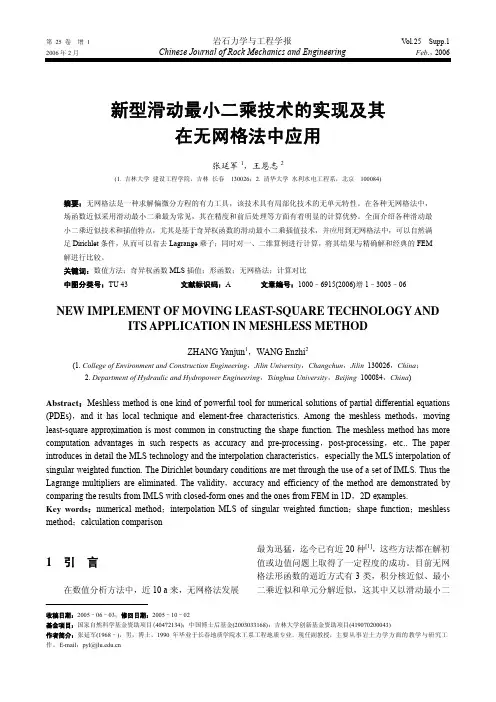
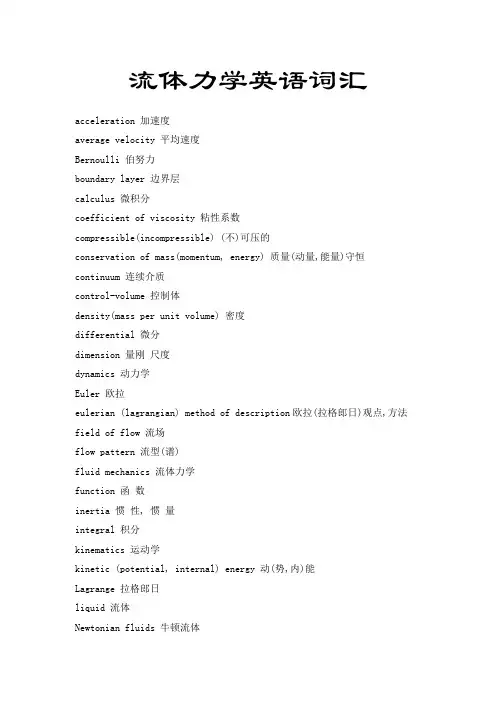
流体力学英语词汇acceleration 加速度average velocity 平均速度Bernoulli 伯努力boundary layer 边界层calculus 微积分coefficient of viscosity 粘性系数compressible(incompressible) (不)可压的conservation of mass(momentum, energy) 质量(动量,能量)守恒continuum 连续介质control-volume 控制体density(mass per unit volume) 密度differential 微分dimension 量刚尺度dynamics 动力学Euler 欧拉eulerian (lagrangian) method of description欧拉(拉格郎日)观点,方法field of flow 流场flow pattern 流型(谱)fluid mechanics 流体力学function 函数inertia 惯性, 惯量integral 积分kinematics 运动学kinetic (potential, internal) energy 动(势,内)能Lagrange 拉格郎日liquid 流体Newtonian fluids 牛顿流体(non)linear (非)线性(non)uniform (非)均匀one-dimensional 一维pathline 迹线perfect-gas law 理想气体定律pressure 压力压强Reynolds 雷诺shear(normal) stress 剪(正)应力solution 解答statics 静力学steady(unsteady) (非)定常strain 应变streamline(tube) 流线(管)thermal conductivity 热传导thermodynamics 热力学variable 变量vector 矢量velocity distribution 速度分布velocity field 速度场velocity gradient 速度梯度viscous(inviscid) (无)粘性的volume rate of flow 体积流量CHAPTER -2absolute (gage,vacuum) pressure 绝对(表,真空)压力area moment of inertia 惯性面积矩atmospheric pressure 大气压力barometer 气压计body force 体力Cartesian [rectangular] coordinates 直角坐标(系)centroid 质心elliptic 椭圆的equilibrium 平衡horizontal 水平的hydrostatic 水静力学,流体静力学hyperbolic 双曲线的mercury 水银moment 矩parabolic 抛物线plane (curved) surface 平(曲)面plate 板pressure center 压力中心pressure distribution(gradient) 压力分布(梯度) reservoir 水库rigid-body 刚体scalar 标量specific weight 比重surface force 表面力vertical 垂直的, 直立的CHAPTER -3Bernoulli equation 伯努力方程Boundaries 边界Conservation of mass 质量Control volume 控制体Energy(hydraulic) grade line 能级线Flux 流率Free body 隔离体Heat transfer 热传到Imaginary 假想Inlet, outlet 进,出口Integrand 被积函数Jet flow 射流Linear(Angular)-momentum relation 线(角)动量关系式Momentum(energy)-flux 动量(能量)流量Net force 合力No slip 无滑移Nozzle 喷嘴Rate of work 功率Reynolds transport theorem 雷诺输运定理Shaft work 轴功Stagnation enthalpy 制止焓Surroundings 外围System 体系Time derivative 时间导数Vector sum 矢量合Venturi tube 文图里管Volume(mass) flow 体积(质量)流量Volume(mass) rate of flow体积(质量)流率CHAPTER -4Soomth 平滑Laminar 层流Transition 转捩Roughness 粗糙度Random fluctuations 随机脉动Reynolds number 雷诺数(Re)Instability 不稳定性Breakdown 崩溃Mean value 平均值Drag 阻力Osborne ReynoldsDye filament 染色丝Internal (external) flow 内(外)流Cartesian 笛卡坐标Infinitesimal 无限小local acceleration 当地加速度dot product 点乘total derivative 全导数convective acceleration 对流加速度substantial(material) derivative 随体(物质)导数operator 算子partial differential equation 偏微分方程Newtonian fluid 牛顿流体Navier-Stokes Equations N-S方程Second-order 二阶Similarity 相似Nondimensionalization 无量纲化Flat-plate boundary layer 平板边界层Thermal conductivity 热传导Heat flow 热流量Fourier's law 傅立叶定律Couette Flow 库塔流动Channel 槽道Parallel plates 平行平板Pressure gradient 压力梯度No-slip condition 无滑移条件Poiseuille flow 伯肖叶流动Parabola 抛物线Wall shear stress 壁面剪应力Prandtl 普朗特Karman 卡门Momentum-integral relation 动量积分关系Momentum thickness 动量厚度Skin-friction coefficient 壁面摩擦系数Displacement thickness 排移厚度Blasius equation 布拉修斯方程Coordinate transformation 坐标变换Composite dimensionless variable 组合无量纲变量Shape factor 形状因子Velocity profile 速度剖面流体动力学 fluid dynamics连续介质力学 mechanics of continuous media介质 medium流体质点 fluid particle无粘性流体 nonviscous fluid, inviscid fluid连续介质假设 continuous medium hypothesis流体运动学 fluid kinematics水静力学 hydrostatics液体静力学 hydrostatics支配方程 governing equation伯努利方程 Bernoulli equation伯努利定理 Bernonlli theorem毕奥-萨伐尔定律 Biot-Savart law欧拉方程 Euler equation亥姆霍兹定理 Helmholtz theorem开尔文定理 Kelvin theorem涡片 vortex sheet库塔-茹可夫斯基条件 Kutta-Zhoukowski condition 布拉休斯解 Blasius solution达朗贝尔佯廖 d'Alembert paradox雷诺数 Reynolds number施特鲁哈尔数 Strouhal number随体导数 material derivative不可压缩流体 incompressible fluid质量守恒 conservation of mass动量守恒 conservation of momentum能量守恒 conservation of energy动量方程 momentum equation能量方程 energy equation控制体积 control volume液体静压 hydrostatic pressure 涡量拟能 enstrophy压差 differential pressure流[动] flow流线 stream line流面 stream surface流管 stream tube迹线 path, path line流场 flow field流态 flow regime流动参量 flow parameter流量 flow rate, flow discharge 涡旋 vortex涡量 vorticity涡丝 vortex filament涡线 vortex line涡面 vortex surface涡层 vortex layer涡环 vortex ring涡对 vortex pair涡管 vortex tube涡街 vortex street卡门涡街 Karman vortex street 马蹄涡 horseshoe vortex对流涡胞 convective cell卷筒涡胞 roll cell涡 eddy涡粘性 eddy viscosity环流 circulation环量 circulation速度环量 velocity circulation 偶极子 doublet, dipole驻点 stagnation point总压[力] total pressure总压头 total head静压头 static head总焓 total enthalpy能量输运 energy transport速度剖面 velocity profile库埃特流 Couette flow单相流 single phase flow单组份流 single-component flow均匀流 uniform flow非均匀流 nonuniform flow二维流 two-dimensional flow三维流 three-dimensional flow准定常流 quasi-steady flow非定常流 unsteady flow, non-steady flow 暂态流 transient flow周期流 periodic flow振荡流 oscillatory flow分层流 stratified flow无旋流 irrotational flow有旋流 rotational flow轴对称流 axisymmetric flow不可压缩性 incompressibility不可压缩流[动] incompressible flow浮体 floating body定倾中心 metacenter阻力 drag, resistance减阻 drag reduction表面力 surface force表面张力 surface tension毛细[管]作用 capillarity来流 incoming flow自由流 free stream自由流线 free stream line外流 external flow进口 entrance, inlet出口 exit, outlet扰动 disturbance, perturbation分布 distribution传播 propagation色散 dispersion弥散 dispersion附加质量 added mass ,associated mass收缩 contraction镜象法 image method无量纲参数 dimensionless parameter 几何相似 geometric similarity运动相似 kinematic similarity动力相似[性] dynamic similarity平面流 plane flow势 potential势流 potential flow速度势 velocity potential复势 complex potential复速度 complex velocity流函数 stream function源 source汇 sink速度[水]头 velocity head拐角流 corner flow空泡流 cavity flow超空泡 supercavity超空泡流 supercavity flow空气动力学 aerodynamics低速空气动力学 low-speed aerodynamics 高速空气动力学 high-speed aerodynamics 气动热力学 aerothermodynamics亚声速流[动] subsonic flow跨声速流[动] transonic flow超声速流[动] supersonic flow锥形流 conical flow楔流 wedge flow叶栅流 cascade flow非平衡流[动] non-equilibrium flow细长体 slender body细长度 slenderness钝头体 bluff body钝体 blunt body翼型 airfoil翼弦 chord薄翼理论 thin-airfoil theory构型 configuration后缘 trailing edge迎角 angle of attack失速 stall脱体激波 detached shock wave波阻 wave drag诱导阻力 induced drag诱导速度 induced velocity临界雷诺数 critical Reynolds number 前缘涡 leading edge vortex附着涡 bound vortex约束涡 confined vortex气动中心 aerodynamic center气动力 aerodynamic force气动噪声 aerodynamic noise气动加热 aerodynamic heating离解 dissociation地面效应 ground effect气体动力学 gas dynamics稀疏波 rarefaction wave热状态方程 thermal equation of state喷管 Nozzle普朗特-迈耶流 Prandtl-Meyer flow瑞利流 Rayleigh flow可压缩流[动] compressible flow可压缩流体 compressible fluid绝热流 adiabatic flow非绝热流 diabatic flow未扰动流 undisturbed flow等熵流 isentropic flow匀熵流 homoentropic flow兰金-于戈尼奥条件 Rankine-Hugoniot condition 状态方程 equation of state量热状态方程 caloric equation of state完全气体 perfect gas拉瓦尔喷管 Laval nozzle马赫角 Mach angle马赫锥 Mach cone马赫线 Mach line马赫数 Mach number马赫波 Mach wave当地马赫数 local Mach number 冲击波 shock wave激波 shock wave正激波 normal shock wave斜激波 oblique shock wave头波 bow wave附体激波 attached shock wave 激波阵面 shock front激波层 shock layer压缩波 compression wave反射 reflection折射 refraction散射 scattering衍射 diffraction绕射 diffraction出口压力 exit pressure超压[强] over pressure反压 back pressure爆炸 explosion爆轰 detonation缓燃 deflagration水动力学 hydrodynamics液体动力学 hydrodynamics泰勒不稳定性 Taylor instability 盖斯特纳波 Gerstner wave斯托克斯波 Stokes wave瑞利数 Rayleigh number自由面 free surface波速 wave speed, wave velocity 波高 wave height波列 wave train波群 wave group波能 wave energy表面波 surface wave表面张力波 capillary wave规则波 regular wave不规则波 irregular wave浅水波 shallow water wave深水波 deep water wave重力波 gravity wave椭圆余弦波 cnoidal wave潮波 tidal wave涌波 surge wave破碎波 breaking wave船波 ship wave非线性波 nonlinear wave孤立子 soliton水动[力]噪声 hydrodynamic noise 水击 water hammer空化 cavitation空化数 cavitation number空蚀 cavitation damage超空化流 supercavitating flow 水翼 hydrofoil水力学 hydraulics洪水波 flood wave涟漪 ripple消能 energy dissipation海洋水动力学 marine hydrodynamics 谢齐公式 Chezy formula欧拉数 Euler number弗劳德数 Froude number水力半径 hydraulic radius水力坡度 hvdraulic slope高度水头 elevating head水头损失 head loss水位 water level水跃 hydraulic jump含水层 aquifer排水 drainage排放量 discharge壅水曲线 back water curve压[强水]头 pressure head过水断面 flow cross-section明槽流 open channel flow孔流 orifice flow无压流 free surface flow有压流 pressure flow缓流 subcritical flow急流 supercritical flow渐变流 gradually varied flow急变流 rapidly varied flow临界流 critical flow异重流 density current, gravity flow 堰流 weir flow掺气流 aerated flow含沙流 sediment-laden stream降水曲线 dropdown curve沉积物 sediment, deposit沉[降堆]积 sedimentation, deposition 沉降速度 settling velocity流动稳定性 flow stability不稳定性 instability奥尔-索末菲方程 Orr-Sommerfeld equation 涡量方程 vorticity equation泊肃叶流 Poiseuille flow奥辛流 Oseen flow剪切流 shear flow粘性流[动] viscous flow层流 laminar flow分离流 separated flow二次流 secondary flow近场流 near field flow远场流 far field flow滞止流 stagnation flow尾流 wake [flow]回流 back flow反流 reverse flow射流 jet自由射流 free jet管流 pipe flow, tube flow内流 internal flow拟序结构 coherent structure 猝发过程 bursting process表观粘度 apparent viscosity 运动粘性 kinematic viscosity 动力粘性 dynamic viscosity泊 poise厘泊 centipoise厘沱 centistoke剪切层 shear layer次层 sublayer流动分离 flow separation层流分离 laminar separation 湍流分离 turbulent separation 分离点 separation point附着点 attachment point再附 reattachment再层流化 relaminarization起动涡 starting vortex驻涡 standing vortex涡旋破碎 vortex breakdown涡旋脱落 vortex shedding压[力]降 pressure drop压差阻力 pressure drag压力能 pressure energy型阻 profile drag滑移速度 slip velocity无滑移条件 non-slip condition壁剪应力 skin friction, frictional drag 壁剪切速度 friction velocity磨擦损失 friction loss磨擦因子 friction factor耗散 dissipation滞后 lag相似性解 similar solution局域相似 local similarity气体润滑 gas lubrication液体动力润滑 hydrodynamic lubrication浆体 slurry泰勒数 Taylor number纳维-斯托克斯方程 Navier-Stokes equation牛顿流体 Newtonian fluid边界层理论 boundary later theory边界层方程 boundary layer equation边界层 boundary layer附面层 boundary layer层流边界层 laminar boundary layer湍流边界层 turbulent boundary layer温度边界层 thermal boundary layer边界层转捩 boundary layer transition边界层分离 boundary layer separation边界层厚度 boundary layer thickness位移厚度 displacement thickness本文来自: 恒星英语学习网() 详细出处参考:/word/sxwl/2009-01-26/66896.html动量厚度 momentum thickness能量厚度 energy thickness焓厚度 enthalpy thickness注入 injection吸出 suction泰勒涡 Taylor vortex速度亏损律 velocity defect law形状因子 shape factor测速法 anemometry粘度测定法 visco[si] metry流动显示 flow visualization油烟显示 oil smoke visualization孔板流量计 orifice meter频率响应 frequency response油膜显示 oil film visualization阴影法 shadow method纹影法 schlieren method烟丝法 smoke wire method丝线法 tuft method氢泡法 nydrogen bubble method相似理论 similarity theory相似律 similarity law部分相似 partial similarity定理 pi theorem, Buckingham theorem 静[态]校准 static calibration动态校准 dynamic calibration风洞 wind tunnel激波管 shock tube激波管风洞 shock tube wind tunnel水洞 water tunnel拖曳水池 towing tank旋臂水池 rotating arm basin扩散段 diffuser测压孔 pressure tap皮托管 pitot tube普雷斯顿管 preston tube斯坦顿管 Stanton tube文丘里管 Venturi tubeU形管 U-tube压强计 manometer微压计 micromanometer多管压强计 multiple manometer静压管 static [pressure]tube流速计 anemometer风速管 Pitot- static tube激光多普勒测速计 laser Doppler anemometer, laser Doppler velocimeter 热线流速计 hot-wire anemometer热膜流速计 hot- film anemometer流量计 flow meter粘度计 visco[si] meter涡量计 vorticity meter传感器 transducer, sensor压强传感器 pressure transducer热敏电阻 thermistor示踪物 tracer时间线 time line脉线 streak line尺度效应 scale effect壁效应 wall effect堵塞 blockage堵寒效应 blockage effect动态响应 dynamic response响应频率 response frequency底压 base pressure菲克定律 Fick law巴塞特力 Basset force埃克特数 Eckert number格拉斯霍夫数 Grashof number努塞特数 Nusselt number普朗特数 prandtl number雷诺比拟 Reynolds analogy施密特数 schmidt number斯坦顿数 Stanton number对流 convection自由对流 natural convection, free convec-tion 强迫对流 forced convection热对流 heat convection质量传递 mass transfer传质系数 mass transfer coefficient热量传递 heat transfer传热系数 heat transfer coefficient对流传热 convective heat transfer辐射传热 radiative heat transfer动量交换 momentum transfer能量传递 energy transfer传导 conduction热传导 conductive heat transfer热交换 heat exchange临界热通量 critical heat flux浓度 concentration扩散 diffusion扩散性 diffusivity扩散率 diffusivity扩散速度 diffusion velocity分子扩散 molecular diffusion沸腾 boiling蒸发 evaporation气化 gasification凝结 condensation成核 nucleation计算流体力学 computational fluid mechanics 多重尺度问题 multiple scale problem伯格斯方程 Burgers equation对流扩散方程 convection diffusion equation KDU方程 KDV equation修正微分方程 modified differential equation 拉克斯等价定理 Lax equivalence theorem数值模拟 numerical simulation大涡模拟 large eddy simulation数值粘性 numerical viscosity。
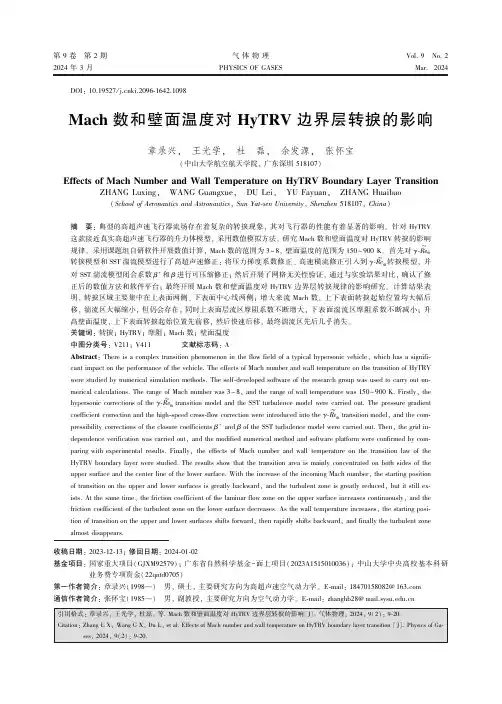
第9卷㊀第2期2024年3月气体物理PHYSICSOFGASESVol.9㊀No.2Mar.2024㊀㊀DOI:10.19527/j.cnki.2096 ̄1642.1098Mach数和壁面温度对HyTRV边界层转捩的影响章录兴ꎬ㊀王光学ꎬ㊀杜㊀磊ꎬ㊀余发源ꎬ㊀张怀宝(中山大学航空航天学院ꎬ广东深圳518107)EffectsofMachNumberandWallTemperatureonHyTRVBoundaryLayerTransitionZHANGLuxingꎬ㊀WANGGuangxueꎬ㊀DULeiꎬ㊀YUFayuanꎬ㊀ZHANGHuaibao(SchoolofAeronauticsandAstronauticsꎬSunYat ̄senUniversityꎬShenzhen518107ꎬChina)摘㊀要:典型的高超声速飞行器流场存在着复杂的转捩现象ꎬ其对飞行器的性能有着显著的影响ꎮ针对HyTRV这款接近真实高超声速飞行器的升力体模型ꎬ采用数值模拟方法ꎬ研究Mach数和壁面温度对HyTRV转捩的影响规律ꎮ采用课题组自研软件开展数值计算ꎬMach数的范围为3~8ꎬ壁面温度的范围为150~900Kꎮ首先对γ ̄Re~θt转捩模型和SST湍流模型进行了高超声速修正:将压力梯度系数修正㊁高速横流修正引入到γ ̄Re~θt转捩模型ꎬ并对SST湍流模型闭合系数β∗和β进行可压缩修正ꎻ然后开展了网格无关性验证ꎬ通过与实验结果对比ꎬ确认了修正后的数值方法和软件平台ꎻ最终开展Mach数和壁面温度对HyTRV边界层转捩规律的影响研究ꎮ计算结果表明ꎬ转捩区域主要集中在上表面两侧㊁下表面中心线两侧ꎻ增大来流Mach数ꎬ上下表面转捩起始位置均大幅后移ꎬ湍流区大幅缩小ꎬ但仍会存在ꎬ同时上表面层流区摩阻系数不断增大ꎬ下表面湍流区摩阻系数不断减小ꎻ升高壁面温度ꎬ上下表面转捩起始位置先前移ꎬ然后快速后移ꎬ最终湍流区先后几乎消失ꎮ关键词:转捩ꎻHyTRVꎻ摩阻ꎻMach数ꎻ壁面温度㊀㊀㊀收稿日期:2023 ̄12 ̄13ꎻ修回日期:2024 ̄01 ̄02基金项目:国家重大项目(GJXM92579)ꎻ广东省自然科学基金-面上项目(2023A1515010036)ꎻ中山大学中央高校基本科研业务费专项资金(22qntd0705)第一作者简介:章录兴(1998 )㊀男ꎬ硕士ꎬ主要研究方向为高超声速空气动力学ꎮE ̄mail:184****8082@163.com通信作者简介:张怀宝(1985 )㊀男ꎬ副教授ꎬ主要研究方向为空气动力学ꎮE ̄mail:zhanghb28@mail.sysu.edu.cn中图分类号:V211ꎻV411㊀㊀文献标志码:AAbstract:Thereisacomplextransitionphenomenonintheflowfieldofatypicalhypersonicvehicleꎬwhichhasasignifi ̄cantimpactontheperformanceofthevehicle.TheeffectsofMachnumberandwalltemperatureonthetransitionofHyTRVwerestudiedbynumericalsimulationmethods.Theself ̄developedsoftwareoftheresearchgroupwasusedtocarryoutnu ̄mericalcalculations.TherangeofMachnumberwas3~8ꎬandtherangeofwalltemperaturewas150~900K.Firstlyꎬthehypersoniccorrectionsoftheγ ̄Re~θttransitionmodelandtheSSTturbulencemodelwerecarriedout.Thepressuregradientcoefficientcorrectionandthehigh ̄speedcross ̄flowcorrectionwereintroducedintotheγ ̄Re~θttransitionmodelꎬandthecom ̄pressibilitycorrectionsoftheclosurecoefficientsβ∗andβoftheSSTturbulencemodelwerecarriedout.Thenꎬthegridin ̄dependenceverificationwascarriedoutꎬandthemodifiednumericalmethodandsoftwareplatformwereconfirmedbycom ̄paringwithexperimentalresults.FinallyꎬtheeffectsofMachnumberandwalltemperatureonthetransitionlawoftheHyTRVboundarylayerwerestudied.Theresultsshowthatthetransitionareaismainlyconcentratedonbothsidesoftheuppersurfaceandthecenterlineofthelowersurface.WiththeincreaseoftheincomingMachnumberꎬthestartingpositionoftransitionontheupperandlowersurfacesisgreatlybackwardꎬandtheturbulentzoneisgreatlyreducedꎬbutitstillex ̄ists.Atthesametimeꎬthefrictioncoefficientofthelaminarflowzoneontheuppersurfaceincreasescontinuouslyꎬandthefrictioncoefficientoftheturbulentzoneonthelowersurfacedecreases.Asthewalltemperatureincreasesꎬthestartingposi ̄tionoftransitionontheupperandlowersurfacesshiftsforwardꎬthenrapidlyshiftsbackwardꎬandfinallytheturbulentzonealmostdisappears.气体物理2024年㊀第9卷Keywords:transitionꎻHyTRVꎻfrictionꎻMachnumberꎻwalltemperature引㊀言高超声速飞行器具有突防能力强㊁打击范围广㊁响应迅速等显著优势ꎬ正逐渐成为各国空天竞争的热点[1]ꎮ高超声速飞行器边界层转捩是该类飞行器气动设计中的重要问题[2]ꎮ在边界层转捩过程中ꎬ流态由层流转变为湍流ꎬ飞行器的表面摩阻急剧增大到层流时的3~5倍ꎬ严重影响飞行器的气动性能与热防护系统ꎬ转捩还会导致飞行器壁面烧蚀㊁颤振加剧㊁飞行姿态控制难度大等一系列问题ꎬ对飞行器的飞行安全构成严重的威胁[3 ̄5]ꎬ开展高超声速飞行器边界层转捩研究具有十分重要的意义ꎮ影响边界层转捩的因素很多ꎬ例如ꎬMach数㊁Reynolds数㊁湍流强度㊁表面传导热等ꎮ在高超声速流动条件下ꎬ强激波㊁强逆压梯度㊁熵层等高超声速现象及其相互作用ꎬ会使得转捩流动的预测和研究难度进一步增大[6]ꎮ目前高超声速飞行器转捩数值模拟方法主要有直接数值模拟(DNS)㊁大涡模拟(LES)和基于Reynolds平均Navier ̄Stokes(RANS)的转捩模型方法ꎬ由于前两种计算量巨大ꎬ难以推广到工程应用ꎬ基于Reynolds平均Navier ̄Stokes的转捩模型在工程实践中应用最为广泛ꎬ其中γ ̄Re~θt转捩模型基于局部变量ꎬ与现代CFD方法良好兼容ꎬ目前已经有多项研究尝试从一般性的流动问题拓展到高超声速流动转捩模拟[6 ̄9]ꎮ目前高超声速流动转捩的研究对象主要是结构相对简单的构型ꎮMcDaniel等[10]研究了扩口直锥在高超声速流动条件下的转捩现象ꎮPapp等[11]研究了圆锥在高超声速流动条件下的转捩特性ꎮ美国和澳大利亚组织联合实施的HIFiRE计划[12]ꎬ研究了圆锥形状的HIFiRE1和椭圆锥形的HIFiRE5的转捩问题ꎮ杨云军等[13]采用数值模拟方法ꎬ分析了椭圆锥的转捩影响机制ꎬ并研究了Reynolds数对转捩特性的影响规律ꎮ另外ꎬ袁先旭等[14]于2015年成功实施了圆锥体MF ̄1航天模型飞行试验ꎮ以上对高超声速流动的转捩研究ꎬ都取得了比较理想的结果ꎬ然而所采用的模型都是圆锥㊁椭圆锥等简单几何外形ꎬ这与真实高超声速飞行器有较大差异ꎬ较难反映真实的转捩特性ꎮ为了有效促进对真实高超声速飞行器的转捩问题研究ꎬ中国空气动力研究与发展中心提出并设计了一款接近真实飞行器的升力体模型ꎬ即高超声速转捩研究飞行器(hypersonictransitionresearchvehicleꎬHyTRV)[15]ꎬ模型详细的参数见参考文献[16]ꎮHyTRV外形如图1所示ꎬ其整体外形较为复杂ꎬ不同区域发生转捩的情况也不尽相同ꎮ对HyTRV的转捩问题研究能够显著提高对真实高超声速飞行器转捩特性的认识水平ꎮLiu等[17]采用理论分析㊁数值模拟和风洞实验3种方法对HyTRV的转捩特性进行了研究ꎻ陈坚强等[15]分析了HyTRV的边界层失稳特征ꎻChen等[18]对HyTRV进行了多维线性稳定性分析ꎻQi等[19]在来流Mach数6㊁攻角0ʎ的条件下对HyTRV进行了直接数值模拟ꎻ万兵兵等[20]结合风洞实验与飞行试验ꎬ利用eN方法预测了HyTRV升力体横流区的转捩阵面形状ꎮ目前ꎬ相关研究主要集中在HyTRV的稳定性特征及转捩预测两个方面ꎬ而对若干关键参数ꎬ特别是Mach数和壁面温度对转捩的影响研究还比较少ꎮ(a)Frontview(b)Sideview㊀㊀㊀图1㊀HyTRV外形Fig.1㊀ShapeofHyTRV基于此ꎬ本文采用数值模拟方法ꎬ应用课题组自研软件开展Mach数和壁面温度对HyTRV转捩流动的影响规律研究ꎮ1㊀数值方法1.1㊀控制方程和数值方法控制方程为三维可压缩RANS方程ꎬ采用结构网格技术和有限体积方法ꎬ变量插值方法采用2阶MUSCL格式ꎬ通量计算采用低耗散的通量向量差分Roe格式ꎬ黏性项离散采用中心格式ꎬ时间推进方法采用LU ̄SGS格式ꎮ壁面采用等温㊁无滑移壁面条件ꎬ入口采用Riemann远场边界条件ꎬ出口采用零梯度外推边界条件ꎮ1.2㊀γ ̄Re~θt转捩模型γ ̄Re~θt转捩模型是Menter等[21ꎬ22]于2004年提01第2期章录兴ꎬ等:Mach数和壁面温度对HyTRV边界层转捩的影响出的一种基于拟合公式的间歇因子转捩模型ꎬ在2009年公布了完整的拟合公式及相关参数[23]ꎮ许多学者也开发了相应的程序ꎬ并进行了大量的算例验证[24 ̄28]ꎬ证明了该模型具有较好的转捩预测能力ꎬ预测精度较高ꎻ通过合适的标定ꎬγ ̄Re~θt转捩模型可以适用于多种情况下的转捩模拟ꎮ该模型构建了关于间歇因子γ的输运方程和关于转捩动量厚度Reynolds数Re~θt的输运方程ꎮ具体来说ꎬγ表示该位置是湍流流动的概率ꎬ取值范围为0<γ<1ꎮ关于γ的控制方程为Ə(ργ)Ət+Ə(ρujγ)Əxj=Pγ-Eγ+ƏƏxjμ+μtσfæèçöø÷ƏγƏxjéëêêùûúú其中ꎬPγ为生成项ꎬEγ为破坏项ꎮ关于Re~θt的输运方程为Ə(ρRe~θt)Ət+Ə(ρujRe~θt)Əxj=Pθt+ƏƏxjσθt(μ+μt)ƏRe~θtƏxjéëêêùûúú其中ꎬPθt为源项ꎬ其作用是使边界层外部的Re~θt等于Reθtꎬ定义式为Pθt=cθtρt(Reθt-Re~θt)(1.0-Fθt)Reθt采用以下经验公式Reθt=1173.51-589 428Tu+0.2196Tu2æèçöø÷F(λθ)ꎬTuɤ0.3Reθt=331.50(Tu-0.5658)-0.671F(λθ)ꎬTu>0.3ìîíïïïïF(λθ)=1+(12.986λθ+123.66λ2θ+405.689λ3θ)e-(Tu1.5)1.5ꎬ㊀λθɤ0F(λθ)=1+0.275(1-e-35.0λθ)e-(Tu0.5)ꎬλθ>0ìîíïïïï在实际计算中ꎬ通过γ ̄Re~θt转捩模型获得间歇因子ꎬ再通过间歇因子来控制SSTk ̄ω湍流模型中湍动能的生成ꎮγ ̄Re~θt转捩模型与SSTk ̄ω湍流模型耦合为Ə(ρk)Ət+Ə(ρujk)Əxj=γeffτijƏuiƏxj-min(max(γeffꎬ0.1)ꎬ1.0)ρβ∗kω+ƏƏxjμ+μtσkæèçöø÷ƏkƏxjéëêêùûúúƏ(ρω)Ət+Ə(ρujω)Əxj=γvtτijƏuiƏxj-βρω2+ƏƏxj(μ+σωμt)ƏωƏxjéëêêùûúú+2ρ(1-F1)σω21ωƏkƏxjƏωƏxj模型中具体参数定义见文献[23]ꎮ1.3㊀高超声速修正原始SST湍流模型及γ ̄Re~θt转捩模型都是基于不可压缩流动发展的ꎬ为了更好地预测高超声速流动转捩ꎬ本节引入了3种重要的高超声速修正方法ꎮ1.3.1㊀压力梯度修正压力梯度对边界层转捩的影响较大ꎬ在高Mach数情况下ꎬ边界层厚度较大ꎬ进而影响压力梯度的大小ꎬ因此在模拟高超声速流动时应该考虑Mach数对压力梯度的影响ꎮ本文采用张毅峰等[29]提出的压力梯度修正方法ꎬ具体修正形式如下λᶄθ=λθ1+γᶄ-12Maeæèçöø÷其中ꎬMae为边界层外缘Mach数ꎬγᶄ为比热比ꎮ1.3.2㊀高速横流修正在原始γ ̄Re~θt转捩模型中ꎬ没有考虑横流不稳定性对转捩的影响ꎬ对于横流模态主导的转捩ꎬ原始转捩模型计算的结果并不理想ꎮLangtry等[30]在2015年对γ ̄Re~θt转捩模型进行了低速横流修正ꎬ向星皓等[9]在Langtry低速横流修正的基础上ꎬ对高超声速椭圆锥转捩DNS数据进行了拓展ꎬ提出了高速横流转捩判据ꎬ本文直接采用向星皓提出的高速横流转捩方法ꎮLangtry将横流强度引入转捩发生动量厚度Reynolds数输运方程中Ə(ρRe~θt)Ət+Ə(ρujRe~θt)Əxj=Pθt+DSCF+ƏƏxjσθt(μ+μt)ƏRe~θtƏxjéëêêùûúú式中ꎬDSCF为横流源项ꎬLangtry低速横流修正为DSCF=cθtρtccrossflowmin(ReSCF-Re~θtꎬ0.0)Fθt2其中ꎬReSCF为低速横流判据ReSCF=θtρUlocal0.82æèçöø÷μ=-35.088lnhθtæèçöø÷+319.51+f(+ΔHcrossflow)-f(-ΔHcrossflow)其中ꎬh为壁面粗糙度高度ꎬθt为动量厚度ꎬ11气体物理2024年㊀第9卷ΔHcrossflow是横流强度抬升项ꎮ向星皓提出的高速横流转捩判据ꎬ其中高速横流源项DSCF ̄H为DSCF ̄H=cCFρmin(ReSCF ̄H-Re~θtꎬ0)FθtReSCF ̄H=CCF ̄1lnhlμ+CCF ̄2+(Hcrossflow)其中ꎬCCF ̄1=-9.618ꎬCCF ̄2=128.33ꎻlμ为粗糙度参考高度ꎬlμ=1μmꎻf(Hcrossflow)为抬升函数f(Hcrossflow)=60000.1066-ΔHcrossflow+50000(0.1066-ΔHcrossflow)2其中ꎬΔHcrossflow与Langtry低速横流修正中保持一致ꎮ1.3.3㊀SST可压缩修正高超声速流动具有强可压缩性ꎬ所以在进行高超声速计算时ꎬ应该对湍流模型进行可压缩修正ꎮSarkar[31]提出了膨胀耗散修正ꎬ对SST湍流模型中的闭合系数β∗ꎬβ进行了可压缩修正ꎬWilcox[32]在Sarkar修正的基础上考虑了可压缩生成项产生时的延迟效应ꎬ使得可压缩修正在湍流Mach数较小的近壁面关闭ꎬ在湍流Mach数较大的自由剪切层打开ꎬ本文采用Wilcox提出的可压缩性修正β∗=β∗0[1+ξ∗F(Mat)]β=β0-β∗0ξ∗F(Mat)其中ꎬβ0ꎬβ∗均为原始模型中的系数ꎬξ∗=1.5ꎮF(Mat)=[Mat-Mat0]H(Mat-Mat0)Mat0=1/4ꎬH(x)=0ꎬxɤ01ꎬx>0{其中ꎬMat=2k/a为湍流Mach数ꎬa为当地声速ꎮ2㊀网格无关性验证及数值方法确认2.1㊀网格无关性验证计算采用3套网格ꎬ考虑到HyTRV的几何对称性ꎬ生成3套半模网格ꎬ第1层网格高度为1ˑ10-6mꎬ确保y+<1ꎬ流向ˑ法向ˑ周向的网格数分别为:网格1是301ˑ201ˑ201ꎬ网格2是301ˑ301ˑ201ꎬ网格3是401ˑ381ˑ281ꎮ全模下表面如图2所示ꎬ选取y/L=0中心线和x/L=0.5处ꎬ对比3套网格的表面摩阻系数ꎬ计算结果如图3所示ꎮ采用网格1时ꎬ表面摩阻系数分布与另外两个结果存在明显差异ꎻ而采用网格2和网格3时ꎬ表面摩阻系数曲线基本重合ꎬ表明在流向㊁法向和周向均满足网格无关性ꎬ后续数值计算采用网格2ꎮ图2㊀截取位置示意图Fig.2㊀Schematicdiagramoftheinterceptionlocation(a)Surfacefrictionaty/L=0(b)Surfacefrictionatx/L=0.5图3㊀采用3套网格计算得到的摩阻对比Fig.3㊀Comparisonofthefrictiondragcalculatedusingthreesetsofgrids2.2㊀数值方法和自研软件的确认采用修正后的转捩模型对HyTRV开展计算ꎬ计算工况为Ma=6ꎬ来流温度Tɕ=97Kꎬ单位21第2期章录兴ꎬ等:Mach数和壁面温度对HyTRV边界层转捩的影响Reynolds数为Re=1.1ˑ107/mꎬ攻角α=0ʎꎬ来流湍流度FSTI=0.8%ꎬ壁面温度T=300Kꎮ为方便对比分析ꎬ计算结果与参考结果均采用上下对称形式布置ꎬ例如ꎬ图4是模型下表面计算结果与实验结果对比:对于下表面两侧转捩的起始位置ꎬ高超声速修正前的转捩位置在x=0.68m附近ꎬ高超声速修正后的计算结果与实验结果吻合良好ꎬ均在x=0.60m附近ꎬ并且湍流边界层区域形状基本一致ꎬ说明修正后的转捩模型能够较好地预测HyTRV转捩的位置ꎮ(a)Calculationofthefrictiondistribution(beforehypersoniccorrection)(b)Calculationofthefrictiondistribution(afterhypersoniccorrection)(c)Experimentalresultsoftheheatfluxdistribution[17]图4㊀下表面计算结果和实验结果对比Fig.4㊀Comparisonofthecalculatedandexperimentalresultsonthelowersurface3㊀HyTRV转捩的基本流动特性计算工况采用Ma=6ꎬ攻角α=0ʎꎬ来流湍流度FSTI=0.6%ꎬ分析HyTRV转捩的基本流动特性ꎮ从图5可以看出ꎬ模型两侧和顶端均出现高压区ꎬ高压区之间为低压区ꎬ横截面上存在周向压力梯度ꎬ流动从高压区向低压区汇集ꎬ从而在下表面中心线附近和上表面两侧腰部区域均形成流向涡结构(见图6)ꎬ沿流动方向ꎬ高压区域逐渐扩大ꎬ流向涡结构的影响范围也越大ꎮ在流向涡结构的边缘位置ꎬ壁面附近的低速流体被抬升到外壁面区域ꎬ外壁面区域的高速流体又被带入到近壁面区域ꎬ进而导致流向涡结构边缘处壁面的摩阻显著增加ꎬ最终诱发转捩ꎬ这些流动特征与文献[15]的结果一致ꎮ图7显示了上下表面摩阻的分布情况ꎬ其中上表面两侧区域在x/L=0.80附近ꎬ摩阻显著增加ꎬ出现明显的转捩现象ꎬ转捩区域分布在两侧边缘位置ꎻ而下表面两侧区域在x/L=0.75附近ꎬ也出现明显的转捩ꎬ转捩区域相对集中在中心线两侧ꎮ图5㊀不同截面位置处的压力云图Fig.5㊀Pressurecontoursatdifferentcross ̄sectionlocations图6㊀不同截面位置处的流向速度云图Fig.6㊀Streamwisevelocitycontoursatdifferentcross ̄sectionlocations31气体物理2024年㊀第9卷(a)Uppersurface㊀㊀㊀㊀㊀(b)Lowersurface图7㊀上下表面摩阻分布云图Fig.7㊀Frictioncoefficientcontoursontheupperandlowersurfaces4㊀不同Mach数对HyTRV转捩的影响保持来流湍流度FSTI=0.6%不变ꎬMach数变化范围为3~8ꎮ图8是不同Mach数条件下HyTRV上下表面的摩阻分布云图ꎬ从图中可知ꎬ随着Mach数的增加ꎬ上下表面的湍流区域均逐渐减少ꎬ其中上表面两侧转捩起始位置由x/L=0.56附近后移至x/L=0.92附近ꎬ下表面两侧转捩起始位置由x/L=0.48附近后移至x/L=0.99附近ꎬ上下表面两侧转捩起始位置均大幅后移ꎬ说明Mach数对HyTRV转捩的影响很大ꎮuppersurface㊀㊀㊀㊀㊀㊀㊀㊀㊀㊀㊀㊀㊀㊀㊀㊀lowersurface(a)Ma=3uppersurface㊀㊀㊀㊀㊀㊀㊀㊀㊀㊀㊀㊀㊀㊀㊀㊀lowersurface(b)Ma=4uppersurface㊀㊀㊀㊀㊀㊀㊀㊀㊀㊀㊀㊀㊀㊀㊀㊀lowersurface(c)Ma=541第2期章录兴ꎬ等:Mach数和壁面温度对HyTRV边界层转捩的影响uppersurface㊀㊀㊀㊀㊀㊀㊀㊀㊀㊀㊀㊀㊀㊀㊀㊀lowersurface(d)Ma=6uppersurface㊀㊀㊀㊀㊀㊀㊀㊀㊀㊀㊀㊀㊀㊀㊀㊀lowersurface(e)Ma=7uppersurface㊀㊀㊀㊀㊀㊀㊀㊀㊀㊀㊀㊀㊀㊀㊀㊀lowersurface(f)Ma=8图8㊀不同Mach数条件下摩阻系数分布云图Fig.8㊀FrictioncoefficientcontoursatdifferentMachnumbers上表面选取图7中z/L=0.12的位置ꎬ下表面选取z/L=0.10的位置进行分析ꎮ从图9中可以分析出ꎬ随着Mach数的增加ꎬ上表面转捩起始位置不断后移ꎬ当Mach数增加到7时ꎬ由于湍流区的缩小ꎬ此处位置不再发生转捩ꎬ此外ꎬMach数越高层流区摩阻系数越大ꎻ下表面转捩起始位置也不断后移ꎬ当Mach数增加到8时ꎬ此处位置不再发生转捩ꎬ此外ꎬMach数越高ꎬ湍流区的摩阻系数越小ꎬ这些结论与关于来流Mach数对转捩位置影响的普遍研究结论一致ꎮ(a)Uppersurface㊀㊀㊀㊀㊀(b)Lowersurface图9㊀不同位置摩阻系数随Mach数的变化Fig.9㊀VariationoffrictioncoefficientwithMachnumberatdifferentlocations51气体物理2024年㊀第9卷5㊀不同壁面温度对HyTRV转捩的影响保持来流湍流度FSTI=0.6%及Ma=6不变ꎬ壁面温度的变化范围为150~900Kꎮ图10是不同壁面温度条件下HyTRV上下表面的摩阻分布云图ꎬ可以看出随着壁面温度的增加ꎬ上表面两侧湍流区域先是缓慢扩大ꎬ在壁面温度为500K时湍流区域快速缩小ꎬ增加到900K时ꎬ已无明显湍流区域ꎻ下表面两侧湍流区域先是无明显变化ꎬ同样当壁面温度升高到500K时ꎬ湍流区域快速缩小ꎬ当壁面温度升高到700K时ꎬ两侧已经无明显的湍流区域ꎬ相比上表面两侧湍流区域ꎬ下表面湍流区域消失得更早ꎮ由此可以得出壁面温度对转捩的产生有较大的影响ꎬ壁面温度增加到一定程度将导致HyTRV没有明显的转捩现象ꎮuppersurface㊀㊀㊀㊀㊀㊀㊀㊀㊀㊀㊀㊀㊀㊀㊀㊀lowersurface(a)T=150Kuppersurface㊀㊀㊀㊀㊀㊀㊀㊀㊀㊀㊀㊀㊀㊀㊀㊀lowersurface(b)T=200Kuppersurface㊀㊀㊀㊀㊀㊀㊀㊀㊀㊀㊀㊀㊀㊀㊀㊀lowersurface(c)T=300Kuppersurface㊀㊀㊀㊀㊀㊀㊀㊀㊀㊀㊀㊀㊀㊀㊀㊀lowersurface(d)T=500K61第2期章录兴ꎬ等:Mach数和壁面温度对HyTRV边界层转捩的影响uppersurface㊀㊀㊀㊀㊀㊀㊀㊀㊀㊀㊀㊀㊀㊀㊀㊀lowersurface(e)T=700Kuppersurface㊀㊀㊀㊀㊀㊀㊀㊀㊀㊀㊀㊀㊀㊀㊀㊀lowersurface(f)T=900K图10㊀不同壁面温度条件下摩阻系数分布云图Fig.10㊀Frictioncoefficientcontoursatdifferentwalltemperatureconditions上表面选取z/L=0.125的位置ꎬ下表面选取z/L=0.100的位置进行分析ꎮ从图11中可以分析出ꎬ随着壁面温度的增加ꎬ上表面转捩起始位置先前移ꎬ当壁面温度增加到500K时ꎬ转捩起始位置后移ꎬ转捩区长度逐渐增加ꎬ层流区域的摩阻系数逐渐增加ꎬ当壁面温度增加到700K时ꎬ该位置已不再出现转捩ꎻ下表面转捩起始位置先小幅后移ꎬ当壁面温度增加到300K时ꎬ转捩起始位置开始后移ꎬ当壁面温度增加到700K时ꎬ由于湍流区域的减小ꎬ该位置不再发生转捩ꎮ(a)Uppersurface㊀㊀㊀㊀㊀(b)Lowersurface图11㊀不同位置摩阻系数随壁面温度的变化Fig.11㊀Variationoffrictioncoefficientwithwalltemperatureatdifferentlocations为进一步分析壁面温度的影响ꎬ本文分别在上下表面湍流区选取一点(0.9ꎬ0.029ꎬ0.14)ꎬ(0.97ꎬ-0.34ꎬ0.12)ꎬ分析边界层湍动能剖面ꎬ结果如图12所示ꎮ从图中可以看到ꎬ随着壁面温度升高ꎬ边界层厚度先略微变厚ꎬ再变薄ꎬ当壁面温度升高到700K时ꎬ边界层厚度迅速降低ꎮ这些结果与转捩位置先前移再后移的结论相符合ꎬ因为边界层厚度会影响不稳定波的时间和空间尺度ꎬ边界层厚度低时ꎬ不稳定波增长速度变慢ꎬ延迟转捩发生ꎮ需要指出的是ꎬ仅采用当前使用的方法ꎬ无法从更深层71气体物理2024年㊀第9卷次揭示转捩反转的流动机理ꎬ而须另外借助稳定性分析方法ꎬ例如ꎬ使用eN方法开展基于模态的稳定性研究ꎮ文献[33]采用该手段研究了大掠角平板钝三角翼随壁温比变化出现转捩反转的内在机理:壁温比升高促进横流模态和第1模态扰动增长ꎬ抑制第2模态发展ꎬ在第1㊁2模态联合作用影响下ꎬ出现转捩反转现象ꎮ我们将在后续开展进一步研究ꎮ(a)Uppersurface(b)Lowersurface图12㊀不同位置湍动能剖面随壁面温度的变化Fig.12㊀Variationofturbulentkineticenergywithwalltemperatureatdifferentlocations6㊀结论针对HyTRV转捩问题ꎬ在Mach数Ma=3~8ꎬ壁面温度T=150~900K的条件下ꎬ基于课题组自研软件ꎬ对γ ̄Re~θt转捩模型和SST湍流模型进行了高超声速修正ꎬ研究了Mach数和壁面温度对HyTRV转捩的影响ꎬ得出以下结论:1)经过高超声速修正后的γ ̄Re~θt转捩模型和SST湍流模型能够较为准确地预测HyTRV转捩位置ꎬ并且湍流边界层区域形状与实验结果基本一致ꎻHyTRV存在多个不同的转捩区域ꎬ上表面两侧转捩区域分布在两侧边缘位置ꎬ下表面两侧转捩区域分布在中心线两侧ꎮ2)Mach数的增加会导致上下表面转捩起始位置均大幅后移ꎬ湍流区大幅缩小ꎬ但当Mach数增加到8时ꎬ湍流区仍然存在ꎬ并没有消失ꎻ上表面层流区摩阻不断增加ꎬ下表面湍流区摩阻不断减小ꎮ3)壁面温度的增加会导致上下表面转捩起始位置先前移ꎬ再后移ꎬ这与边界层厚度变化规律一致ꎬ当壁面温度增加到700K时ꎬ下表面湍流区已经基本消失ꎬ当壁面温度增加到900K时ꎬ上表面湍流区也基本消失ꎻ上表面在层流区域的摩阻系数逐渐增大ꎬ在湍流区的摩阻系数逐渐减小ꎮ致谢㊀感谢中国空气动力研究与发展中心和空天飞行空气动力科学与技术全国重点实验室提供的HyTRV模型数据和实验数据ꎮ参考文献(References)[1]㊀OberingIIIHꎬHeinrichsRL.Missiledefenseforgreatpowerconflict:outmaneuveringtheChinathreat[J].Stra ̄tegicStudiesQuarterlyꎬ2019ꎬ3(4):37 ̄56. [2]ChengCꎬWuJHꎬZhangYLꎬetal.Aerodynamicsanddynamicstabilityofmicro ̄air ̄vehiclewithfourflappingwingsinhoveringflight[J].AdvancesinAerodynamicsꎬ2020ꎬ2(3):5.[3]BertinJJꎬCummingsRM.Fiftyyearsofhypersonics:whereweᶄvebeenꎬwhereweᶄregoing[J].ProgressinAerospaceSciencesꎬ2003ꎬ39(6/7):511 ̄536. [4]陈坚强ꎬ涂国华ꎬ张毅锋ꎬ等.高超声速边界层转捩研究现状与发展趋势[J].空气动力学学报ꎬ2017ꎬ35(3):311 ̄337.ChenJQꎬTuGHꎬZhangYFꎬetal.Hypersnonicboundarylayertransition:whatweknowꎬwhereshallwego[J].ActaAerodynamicaSinicaꎬ2017ꎬ35(3):311 ̄337(inChinese).[5]段毅ꎬ姚世勇ꎬ李思怡ꎬ等.高超声速边界层转捩的若干问题及工程应用研究进展综述[J].空气动力学学报ꎬ2020ꎬ38(2):391 ̄403.DuanYꎬYaoSYꎬLiSYꎬetal.Reviewofprogressinsomeissuesandengineeringapplicationofhypersonicboundarylayertransition[J].ActaAerodynamicaSinicaꎬ2020ꎬ38(2):391 ̄403(inChinese).[6]ZhangYFꎬZhangYRꎬChenJQꎬetal.Numericalsi ̄81第2期章录兴ꎬ等:Mach数和壁面温度对HyTRV边界层转捩的影响mulationsofhypersonicboundarylayertransitionbasedontheflowsolverchant2.0[R].AIAA2017 ̄2409ꎬ2017. [7]KrauseMꎬBehrMꎬBallmannJ.Modelingoftransitioneffectsinhypersonicintakeflowsusingacorrelation ̄basedintermittencymodel[R].AIAA2008 ̄2598ꎬ2008. [8]YiMRꎬZhaoHYꎬLeJL.Hypersonicnaturalandforcedtransitionsimulationbycorrelation ̄basedintermit ̄tency[R].AIAA2017 ̄2337ꎬ2017.[9]向星皓ꎬ张毅锋ꎬ袁先旭ꎬ等.C ̄γ ̄Reθ高超声速三维边界层转捩预测模型[J].航空学报ꎬ2021ꎬ42(9):625711.XiangXHꎬZhangYFꎬYuanXXꎬetal.C ̄γ ̄Reθmodelforhypersonicthree ̄dimensionalboundarylayertransitionprediction[J].ActaAeronauticaetAstronauticaSinicaꎬ2021ꎬ42(9):625711(inChinese).[10]McDanielRDꎬNanceRPꎬHassanHA.Transitiononsetpredictionforhigh ̄speedflow[J].JournalofSpacecraftandRocketsꎬ2000ꎬ37(3):304 ̄309.[11]PappJLꎬDashSM.Rapidengineeringapproachtomodelinghypersoniclaminar ̄to ̄turbulenttransitionalflows[J].JournalofSpacecraftandRocketsꎬ2005ꎬ42(3):467 ̄475.[12]JulianoTJꎬSchneiderSP.InstabilityandtransitionontheHIFiRE ̄5inaMach ̄6quiettunnel[R].AIAA2010 ̄5004ꎬ2010.[13]杨云军ꎬ马汉东ꎬ周伟江.高超声速流动转捩的数值研究[J].宇航学报ꎬ2006ꎬ27(1):85 ̄88.YangYJꎬMaHDꎬZhouWJ.Numericalresearchonsupersonicflowtransition[J].JournalofAstronauticsꎬ2006ꎬ27(1):85 ̄88(inChinese).[14]袁先旭ꎬ何琨ꎬ陈坚强ꎬ等.MF ̄1模型飞行试验转捩结果初步分析[J].空气动力学学报ꎬ2018ꎬ36(2):286 ̄293.YuanXXꎬHeKꎬChenJQꎬetal.PreliminarytransitionresearchanalysisofMF ̄1[J].ActaAerodynamicaSinicaꎬ2018ꎬ36(2):286 ̄293(inChinese).[15]陈坚强ꎬ涂国华ꎬ万兵兵ꎬ等.HyTRV流场特征与边界层稳定性特征分析[J].航空学报ꎬ2021ꎬ42(6):124317.ChenJQꎬTuGHꎬWanBBꎬetal.Characteristicsofflowfieldandboundary ̄layerstabilityofHyTRV[J].ActaAeronauticaetAstronauticaSinicaꎬ2021ꎬ42(6):124317(inChinese).[16]陈坚强ꎬ刘深深ꎬ刘智勇ꎬ等.用于高超声速边界层转捩研究的标模气动布局及设计方法.中国:109969374B[P].2021 ̄05 ̄18.ChenJQꎬLiuSSꎬLiuZYꎬetal.Standardmodelaero ̄dynamiclayoutanddesignmethodforhypersonicboundarylayertransitionresearch.CNꎬ109969374B[P].2021 ̄05 ̄18(inChinese).[17]LiuSSꎬYuanXXꎬLiuZYꎬetal.Designandtransitioncharacteristicsofastandardmodelforhypersonicboundarylayertransitionresearch[J].ActaMechanicaSinicaꎬ2021ꎬ37(11):1637 ̄1647.[18]ChenXꎬDongSWꎬTuGHꎬetal.Boundarylayertran ̄sitionandlinearmodalinstabilitiesofhypersonicflowoveraliftingbody[J].JournalofFluidMechanicsꎬ2022ꎬ938(408):A8.[19]QiHꎬLiXLꎬYuCPꎬetal.Directnumericalsimulationofhypersonicboundarylayertransitionoveralifting ̄bodymodelHyTRV[J].AdvancesinAerodynamicsꎬ2021ꎬ3(1):31.[20]万兵兵ꎬ陈曦ꎬ陈坚强ꎬ等.三维边界层转捩预测HyTEN软件在高超声速典型标模中的应用[J].空天技术ꎬ2023(1):150 ̄158.WanBBꎬChenXꎬChenJQꎬetal.ApplicationsofHyTENsoftwareforpredictingthree ̄dimensionalboundary ̄layertransitionintypicalhypersonicmodels[J].AerospaceTechnologyꎬ2023(1):150 ̄158(inChinese). [21]MenterFRꎬLangtryRBꎬLikkiSRꎬetal.Acorrelation ̄basedtransitionmodelusinglocalvariables PartⅠ:modelformulation[J].JournalofTurbomachineryꎬ2006ꎬ128(3):413 ̄422.[22]LangtryRBꎬMenterFRꎬLikkiSRꎬetal.Acorrelation ̄basedtransitionmodelusinglocalvariables PartⅡ:testcasesandindustrialapplications[J].JournalofTur ̄bomachineryꎬ2006ꎬ128(3):423 ̄434.[23]LangtryRBꎬMenterFR.Correlation ̄basedtransitionmodelingforunstructuredparallelizedcomputationalfluiddynamicscodes[J].AIAAJournalꎬ2009ꎬ47(12):2894 ̄2906.[24]孟德虹ꎬ张玉伦ꎬ王光学ꎬ等.γ ̄Reθ转捩模型在二维低速问题中的应用[J].航空学报ꎬ2011ꎬ32(5):792 ̄801.MengDHꎬZhangYLꎬWangGXꎬetal.Applicationofγ ̄Reθtransitionmodeltotwo ̄dimensionallowspeedflows[J].ActaAeronauticaetAstronauticaSinicaꎬ2011ꎬ32(5):792 ̄801(inChinese).[25]牟斌ꎬ江雄ꎬ肖中云ꎬ等.γ ̄Reθ转捩模型的标定与应用[J].空气动力学学报ꎬ2013ꎬ31(1):103 ̄109.MouBꎬJiangXꎬXiaoZYꎬetal.Implementationandcaliberationofγ ̄Reθtransitionmodel[J].ActaAerody ̄namicaSinicaꎬ2013ꎬ31(1):103 ̄109(inChinese). [26]郭隽ꎬ刘丽平ꎬ徐晶磊ꎬ等.γ ̄Re~θt转捩模型在跨声速涡轮叶栅中的应用[J].推进技术ꎬ2018ꎬ39(9):1994 ̄2001.91气体物理2024年㊀第9卷GuoJꎬLiuLPꎬXuJLꎬetal.Applicationofγ ̄Re~θttran ̄sitionmodelintransonicturbinecascades[J].JournalofPropulsionTechnologyꎬ2018ꎬ39(9):1994 ̄2001(inChinese).[27]郑赟ꎬ李虹杨ꎬ刘大响.γ ̄Reθ转捩模型在高超声速下的应用及分析[J].推进技术ꎬ2014ꎬ35(3):296 ̄304.ZhengYꎬLiHYꎬLiuDX.Applicationandanalysisofγ ̄Reθtransitionmodelinhypersonicflow[J].JournalofPropulsionTechnologyꎬ2014ꎬ35(3):296 ̄304(inChi ̄nese).[28]孔维萱ꎬ阎超ꎬ赵瑞.γ ̄Reθ模式应用于高速边界层转捩的研究[J].空气动力学学报ꎬ2013ꎬ31(1):120 ̄126.KongWXꎬYanCꎬZhaoR.γ ̄Reθmodelresearchforhigh ̄speedboundarylayertransition[J].ActaAerody ̄namicaSinicaꎬ2013ꎬ31(1):120 ̄126(inChinese). [29]张毅锋ꎬ何琨ꎬ张益荣ꎬ等.Menter转捩模型在高超声速流动模拟中的改进及验证[J].宇航学报ꎬ2016ꎬ37(4):397 ̄402.ZhangYFꎬHeKꎬZhangYRꎬetal.ImprovementandvalidationofMenterᶄstransitionmodelforhypersonicflowsimulation[J].JournalofAstronauticsꎬ2016ꎬ37(4):397 ̄402(inChinese).[30]LangtryRBꎬSenguptaKꎬYehDTꎬetal.Extendingtheγ ̄Reθtcorrelationbasedtransitionmodelforcrossfloweffects(Invited)[R].AIAA2015 ̄2474ꎬ2015. [31]SarkarS.Thepressure ̄dilatationcorrelationincompressi ̄bleflows[J].PhysicsofFluidsAꎬ1992ꎬ4(12):2674 ̄2682.[32]WilcoxDC.Dilatation ̄dissipationcorrectionsforadvancedturbulencemodels[J].AIAAJournalꎬ1992ꎬ30(11):2639 ̄2646.[33]马祎蕾ꎬ余平ꎬ姚世勇.壁温对钝三角翼边界层稳定性及转捩影响[J].空气动力学学报ꎬ2020ꎬ38(6):1017 ̄1026.MaYLꎬYuPꎬYaoSY.Effectofwalltemperatureonstabilityandtransitionofhypersonicboundarylayeronabluntdeltawing[J].ActaAerodynamicaSinicaꎬ2020ꎬ38(6):1017 ̄1026(inChinese).02。
流体力学名词流体动力学fluid dynamics 连续介质力学mechanics of continuous介质medium media流体质点fluid particle无粘性流体nonviscous fluid, inviscid fluid连续介质假设continuous medium hypothesis流体运动学fluid kinematics水静力学hydrostatics液体静力学hydrostatics支配方程governing equation伯努利方程Bernoulli equation伯努利定理Bernonlli theorem毕奥-萨伐尔定律Biot-Savart law欧拉方程Euler equation亥姆霍兹定理Helmholtz theorem开尔文定理Kelvin theorem涡片vortex sheet库塔-茹可夫斯基条件Kutta-Zhoukowski condition布拉休斯解Blasius solution达朗贝尔佯廖d'Alembert paradox 雷诺数Reynolds number施特鲁哈尔数Strouhal number随体导数material derivative不可压缩流体incompressible fluid质量守恒conservation of mass动量守恒conservation of momentum 能量守恒conservation of energy动量方程momentum equation能量方程energy equation控制体积control volume液体静压hydrostatic pressure涡量拟能enstrophy压差differential pressure流[动] flow流线stream line流面stream surface流管stream tube迹线path, path line流场flow field流态flow regime流动参量flow parameter流量flow rate, flow discharge 涡旋vortex涡量vorticity涡丝vortex filament涡线vortex line涡面vortex surface涡层vortex layer涡环vortex ring涡对vortex pair涡管vortex tube涡街vortex street卡门涡街Karman vortex street 马蹄涡horseshoe vortex对流涡胞convective cell卷筒涡胞roll cell涡eddy涡粘性eddy viscosity环流circulation环量circulation速度环量velocity circulation 偶极子doublet, dipole驻点stagnation point总压[力] total pressure总压头total head静压头static head总焓total enthalpy能量输运energy transport速度剖面velocity profile库埃特流Couette flow单相流single phase flow单组份流single-component flow均匀流uniform flow非均匀流nonuniform flow二维流two-dimensional flow三维流three-dimensional flow准定常流quasi-steady flow非定常流unsteady flow, non-steady flow 暂态流transient flow周期流periodic flow振荡流oscillatory flow分层流stratified flow无旋流irrotational flow有旋流rotational flow轴对称流axisymmetric flow不可压缩性incompressibility不可压缩流[动] incompressible flow浮体floating body定倾中心metacenter阻力drag, resistance减阻drag reduction表面力surface force表面张力surface tension毛细[管]作用capillarity来流incoming flow自由流free stream 自由流线free stream line外流external flow进口entrance, inlet出口exit, outlet扰动disturbance, perturbation分布distribution传播propagation色散dispersion弥散dispersion附加质量added mass ,associated mass 收缩contraction镜象法image method无量纲参数dimensionless parameter 几何相似geometric similarity运动相似kinematic similarity动力相似[性] dynamic similarity平面流plane flow势potential势流potential flow速度势velocity potential复势complex potential复速度complex velocity流函数stream function源source汇sink速度[水]头velocity head拐角流corner flow空泡流cavity flow超空泡supercavity超空泡流supercavity flow空气动力学aerodynamics低速空气动力学low-speed aerodynamics 高速空气动力学high-speed aerodynamics 气动热力学aerothermodynamics亚声速流[动] subsonic flow跨声速流[动] transonic flow超声速流[动] supersonic flow锥形流conical flow楔流wedge flow叶栅流cascade flow非平衡流[动] non-equilibrium flow细长体slender body细长度slenderness钝头体bluff body钝体blunt body翼型airfoil翼弦chord薄翼理论thin-airfoil theory构型configuration后缘trailing edge迎角angle of attack失速stall脱体激波detached shock wave波阻wave drag诱导阻力induced drag诱导速度induced velocity临界雷诺数critical Reynolds number 前缘涡leading edge vortex附着涡bound vortex约束涡confined vortex气动中心aerodynamic center气动力aerodynamic force气动噪声aerodynamic noise气动加热aerodynamic heating离解dissociation地面效应ground effect气体动力学gas dynamics稀疏波rarefaction wave热状态方程thermal equation of state 喷管Nozzle普朗特-迈耶流Prandtl-Meyer flow瑞利流Rayleigh flow可压缩流[动] compressible flow可压缩流体compressible fluid绝热流adiabatic flow非绝热流diabatic flow未扰动流undisturbed flow等熵流isentropic flow匀熵流homoentropic flow兰金-于戈尼奥条件Rankine-Hugoniot condition 状态方程equation of state量热状态方程caloric equation of state完全气体perfect gas拉瓦尔喷管Laval nozzle马赫角Mach angle马赫锥Mach cone马赫线Mach line马赫数Mach number马赫波Mach wave当地马赫数local Mach number冲击波shock wave激波shock wave正激波normal shock wave斜激波oblique shock wave头波bow wave附体激波attached shock wave 激波阵面shock front激波层shock layer压缩波compression wave 反射reflection折射refraction散射scattering衍射diffraction绕射diffraction出口压力exit pressure超压[强] over pressure反压back pressure爆炸explosion爆轰detonation缓燃deflagration水动力学hydrodynamics液体动力学hydrodynamics泰勒不稳定性Taylor instability 盖斯特纳波Gerstner wave斯托克斯波Stokes wave瑞利数Rayleigh number自由面free surface波速wave speed, wave velocity 波高wave height波列wave train波群wave group波能wave energy表面波surface wave表面张力波capillary wave规则波regular wave不规则波irregular wave浅水波shallow water wave深水波deep water wave重力波gravity wave椭圆余弦波cnoidal wave潮波tidal wave涌波surge wave破碎波breaking wave船波ship wave非线性波nonlinear wave孤立子soliton水动[力]噪声hydrodynamic noise水击water hammer空化cavitation空化数cavitation number空蚀cavitation damage超空化流supercavitating flow水翼hydrofoil水力学hydraulics洪水波flood wave涟漪ripple消能energy dissipation海洋水动力学marine hydrodynamics 谢齐公式Chezy formula欧拉数Euler number弗劳德数Froude number水力半径hydraulic radius水力坡度hvdraulic slope高度水头elevating head水头损失head loss水位water level水跃hydraulic jump含水层aquifer排水drainage排放量discharge壅水曲线back water curve压[强水]头pressure head过水断面flow cross-section 明槽流open channel flow孔流orifice flow无压流free surface flow有压流pressure flow缓流subcritical flow急流supercritical flow渐变流gradually varied flow 急变流rapidly varied flow临界流critical flow异重流density current, gravity flow堰流weir flow掺气流aerated flow含沙流sediment-laden stream降水曲线dropdown curve沉积物sediment, deposit沉[降堆]积sedimentation, deposition沉降速度settling velocity流动稳定性flow stability不稳定性instability奥尔-索末菲方程Orr-Sommerfeld equation涡量方程vorticity equation泊肃叶流Poiseuille flow奥辛流Oseen flow剪切流shear flow粘性流[动] viscous flow层流laminar flow分离流separated flow二次流secondary flow近场流near field flow远场流far field flow滞止流stagnation flow尾流wake [flow]回流back flow反流reverse flow射流jet自由射流free jet管流pipe flow, tube flow内流internal flow拟序结构coherent structure猝发过程bursting process表观粘度apparent viscosity 运动粘性kinematic viscosity动力粘性dynamic viscosity泊poise厘泊centipoise厘沱centistoke剪切层shear layer次层sublayer流动分离flow separation层流分离laminar separation湍流分离turbulent separation 分离点separation point附着点attachment point再附reattachment再层流化relaminarization起动涡starting vortex驻涡standing vortex涡旋破碎vortex breakdown涡旋脱落vortex shedding压[力]降pressure drop压差阻力pressure drag压力能pressure energy型阻profile drag滑移速度slip velocity无滑移条件non-slip condition 壁剪应力skin friction, frictional drag壁剪切速度friction velocity磨擦损失friction loss磨擦因子friction factor耗散dissipation滞后lag相似性解similar solution局域相似local similarity气体润滑gas lubrication液体动力润滑hydrodynamic lubrication浆体slurry泰勒数Taylor number纳维-斯托克斯方程Navier-Stokes equation牛顿流体Newtonian fluid边界层理论boundary later theory边界层方程boundary layer equation边界层boundary layer附面层boundary layer层流边界层laminar boundary layer湍流边界层turbulent boundary layer温度边界层thermal boundary layer边界层转捩boundary layer transition边界层分离boundary layer separation边界层厚度boundary layer thickness位移厚度displacement thickness动量厚度momentum thickness能量厚度energy thickness焓厚度enthalpy thickness注入injection吸出suction泰勒涡Taylor vortex速度亏损律velocity defect law 形状因子shape factor测速法anemometry粘度测定法visco[si] metry流动显示flow visualization油烟显示oil smoke visualization 孔板流量计orifice meter频率响应frequency response油膜显示oil film visualization阴影法shadow method纹影法schlieren method烟丝法smoke wire method丝线法tuft method氢泡法nydrogen bubble method 相似理论similarity theory相似律similarity law部分相似partial similarity定理pi theorem, Buckinghamtheorem静[态]校准static calibration动态校准dynamic calibration风洞wind tunnel激波管shock tube激波管风洞shock tube wind tunnel 水洞water tunnel拖曳水池towing tank旋臂水池rotating arm basin扩散段diffuser测压孔pressure tap皮托管pitot tube普雷斯顿管preston tube斯坦顿管Stanton tube文丘里管Venturi tubeU形管U-tube压强计manometer微压计micromanometer多管压强计multiple manometer 静压管static [pressure]tube流速计anemometer风速管Pitot- static tube激光多普勒测速计laser Doppler anemometer, laser Doppler velocimeter热线流速计hot-wire anemometer热膜流速计hot- film anemometer流量计flow meter粘度计visco[si] meter涡量计vorticity meter传感器transducer, sensor压强传感器pressure transducer热敏电阻thermistor示踪物tracer时间线time line脉线streak line尺度效应scale effect壁效应wall effect堵塞blockage堵寒效应blockage effect动态响应dynamic response响应频率response frequency底压base pressure菲克定律Fick law巴塞特力Basset force埃克特数Eckert number格拉斯霍夫数Grashof number努塞特数Nusselt number普朗特数prandtl number雷诺比拟Reynolds analogy施密特数schmidt number斯坦顿数Stanton number对流convection自由对流natural convection, free convec-tion强迫对流forced convection热对流heat convection质量传递mass transfer传质系数mass transfer coefficient 热量传递heat transfer传热系数heat transfer coefficient 对流传热convective heat transfer辐射传热radiative heat transfer动量交换momentum transfer能量传递energy transfer传导conduction热传导conductive heat transfer热交换heat exchange临界热通量critical heat flux浓度concentration扩散diffusion扩散性diffusivity扩散率diffusivity扩散速度diffusion velocity分子扩散molecular diffusion沸腾boiling蒸发evaporation气化gasification凝结condensation成核nucleation计算流体力学computational fluid dynamics (mechanics) 多重尺度问题multiple scale problem伯格斯方程Burgers equation对流扩散方程convection diffusion equationKDU方程KDV equation修正微分方程modified differential equation拉克斯等价定理Lax equivalence theorem数值模拟numerical simulation大涡模拟large eddy simulation数值粘性numerical viscosity非线性不稳定性nonlinear instability希尔特稳定性分析Hirt stability analysis相容条件consistency conditionCFL条件Courant- Friedrichs- Lewy condition ,CFL condition 狄里克雷边界条件Dirichlet boundary condition熵条件entropy condition远场边界条件far field boundary condition流入边界条件inflow boundary condition无反射边界条件nonreflecting boundary condition数值边界条件numerical boundary condition流出边界条件outflow boundary condition冯.诺伊曼条件von Neumann condition近似因子分解法approximate factorization method人工压缩artificial compression人工粘性artificial viscosity边界元法boundary element method配置方法collocation method能量法energy method有限体积法finite volume method流体网格法fluid in cell method, FLIC method通量校正传输法flux-corrected transport method 通量矢量分解法flux vector splitting method伽辽金法Galerkin method积分方法integral method标记网格法marker and cell method, MAC method 特征线法method of characteristics直线法method of lines矩量法moment method多重网格法multi- grid method板块法panel method质点网格法particle in cell method, PIC method质点法particle method预估校正法predictor-corrector method投影法projection method准谱法pseudo-spectral method随机选取法random choice method激波捕捉法shock-capturing method激波拟合法shock-fitting method谱方法spectral method稀疏矩阵分解法split coefficient matrix method不定常法time-dependent method时间分步法time splitting method变分法variational method涡方法vortex method隐格式implicit scheme显格式explicit scheme交替方向隐格式alternating direction implicit scheme, ADI scheme 反扩散差分格式anti-diffusion difference scheme紧差分格式compact difference scheme守恒差分格式conservation difference scheme克兰克-尼科尔森格式Crank-Nicolson scheme杜福特-弗兰克尔格式Dufort-Frankel scheme指数格式exponential scheme戈本诺夫格式Godunov scheme高分辨率格式high resolution scheme拉克斯-温德罗夫格式Lax-Wendroff scheme蛙跳格式leap-frog scheme单调差分格式monotone difference scheme保单调差分格式monotonicity preserving diffe-rence scheme 穆曼-科尔格式Murman-Cole scheme半隐格式semi-implicit scheme斜迎风格式skew-upstream scheme全变差下降格式total variation decreasing scheme TVD scheme 迎风格式upstream scheme , upwind scheme计算区域computational domain物理区域physical domain影响域domain of influence依赖域domain of dependence区域分解domain decomposition维数分解dimensional split物理解physical solution弱解weak solution黎曼解算子Riemann solver守恒型conservation form弱守恒型weak conservation form强守恒型strong conservation form散度型divergence form贴体曲线坐标body-fitted curvilinear coordi-nates [自]适应网格[self-] adaptive mesh适应网格生成adaptive grid generation自动网格生成automatic grid generation数值网格生成numerical grid generation交错网格staggered mesh网格雷诺数cell Reynolds number数植扩散numerical diffusion数值耗散numerical dissipation数值色散numerical dispersion数值通量numerical flux放大因子amplification factor 放大矩阵amplification matrix阻尼误差damping error离散涡discrete vortex熵通量entropy flux熵函数entropy function分步法fractional step method。
labile 不稳定的labile equilibrium 不稳平衡lability 不稳定性lacing 栅格桁架lag 延迟lag angle 滞后角lagrange bracket 拉格朗日括号lagrange d'alembert principle 拉格朗日达朗伯原理lagrange dirichlet theorem 拉格朗日狄利克莱定理lagrange equations of the first kind 第一类拉格朗日方程lagrange formula 拉格朗日公式lagrange function 拉格朗日函数lagrange gyroscope 拉格朗日陀螺仪lagrange interpolation formula 拉格朗日插值公式lagrange interpolation polynomial 拉格朗日插值多项式lagrange multiplier 拉格朗日乘数lagrange three body problem 拉格朗日三体问题lagrange's equation of motion 拉格朗日运动方程lagrange's equations of the second kind 第二类拉格朗日方程lagrange's theorem 拉格朗日定理lagrange's variable 拉格朗日变量lagrangian 拉格朗日算符lagrangian coordinates 拉格朗日坐标lagrangian correlation 拉格朗日相关lagrangian density 拉格朗日密度lagrangian dynamics 拉格朗日动力学lagrangian multiplier method 拉格朗日乘子法lagrangian operator 拉格朗日算符lagrangian turbulence scale 拉格朗日湍吝度lamb wave 拉姆波lambda shock wave 形激波lambert's equation 朗伯方程lamina 薄片laminar 层聊laminar aerofoil section 层另型laminar boundary layer 层吝界层laminar convection 层猎流laminar flame 层琉焰laminar flow 层流laminar friction 层力擦laminar grating 层状晶格laminar motion 层了动laminar separation 层林离laminar structure 层压结构laminar sublayer 层磷层laminarization 层怜laminate 层压板laminated sheet 层压板laminated spring 叠层弹簧laminated structure 层状结构lamination 叠层lamination theory 叠层理论lamont nozzle 拉蒙喷管landing flap 着陆襟翼lane 航线langmuir frequency 朗谬尔频率langmuir gage 朗谬尔规langmuir manometer 朗谬尔规langmuir oscillation 朗谬尔振荡langmuir type probe 朗谬尔探针laplace coefficient 拉普拉斯系数laplace expansion 拉普拉斯展开laplace formula 拉普拉斯公式laplace operator 拉普拉斯算符laplace transformation 拉普拉斯变换laplace's integral 拉普拉斯积分laplace's theorem 拉普拉斯定理laplace's vector 拉普拉斯矢量laplacian equation 拉普拉斯方程large calorie 大卡large deflection 大挠度large deformation 大变形large reynolds number flow 大雷诺数怜latent energy 潜能latent heat of evaporation 蒸发潜热latent heat of fusion 熔化潜热latent heat of liquefaction 液化潜热latent heat of solidification 凝固潜热latent vector 本崭量lateral 横的lateral buckling 横向压屈lateral contraction 横向收缩lateral deflection 横向挠曲lateral deviation 横向偏差lateral displacement 横向位移lateral force 横向力lateral force coefficient 侧力系数lateral force density 横力密度lateral load 横向载荷lateral pressure 侧压力lateral refraction 侧向折射lateral section 横截面lateral stability 横向稳定性lateral strain 横向应变lateral stress 横向应力lateral velocity 横向速度lateral vibration 横向振动latitude 纬度lattice 晶格lattice gas 晶格气lattice girder 桁架梁lattice parameter 晶格参数lattice structure 晶格结构lattice truss 栅格桁架lattice vibration 点阵振动lattice work 栅格结构launching 发射launching acceleration 发射加速度launching speed 发射速度laurent's expansion 劳朗展开laval density 拉瓦尔密度laval nozzle 拉瓦尔喷嘴laval pressure 拉瓦尔压力laval state 拉瓦尔状态laval temperature 拉瓦尔温度laval velocity 拉瓦尔速度law 法则law of action and reaction 酌反酌定律law of areas 面积定律law of conservation of energy 能量守恒律law of conservation of mass 质量守恒律law of conservation of momentum 动量守恒律law of corresponding state 对应态定律law of elasticity 弹性定律law of equivalence 等效定律law of errors 误差律law of falling bodies 落体定律law of inertia 惯性定律law of mass action 质量酌定律law of moment of momentum 动量矩定律law of motion 运动律law of mutuality of phases 共存相定律law of reflection 反射定律law of resistance for turbulent flow 湍凌力定律law of shearing stress 切应力定律law of similarity transformation 相似变换定律law of the transmissibility of pressure 压力传递定律law of the wall 壁定律law of thermal equilibrium 热平衡定律law of thermodynamics 热力学定律law of torsion stress 切应力定律law of universal gravitation 万有引力定律law of velocity addition 速度加法定律law of vortex motion 涡动定律layer 层layer division 分层layer of fluid 液层layer thickness 层厚度le chatelier's principle 勒夏特利原理leaching 浸出lead angle 超前角leading edge 前缘leading edge vortex 前缘涡流leaf metal 金属薄片leaf spring 板弹簧leak 漏泄leakage 漏泄leakage loss 漏损lean mixture 稀混合气leap 跳跃leap distance 跳跃距离least action principle 最小酌原理least line of resistance 最小阻抗线least square approximation 最小二乘逼近least square method 最小二乘法least work 最小功lee side vortex 下风涡lee wave 背风波lee wave equation 背风波动方程lee wave theory 背风波动理论left hand rule 左手定则left hand screw 左螺旋left handed 在旋的left handed coordinate system 左手坐标系legendre transformation 勒让德变换lemniscate 双纽线length 长度length measurement 长度测量length measuring 长度测量length measuring machine 测长器length of action 咬合长度length of path 路径长度length of run 滑走距离length unit 长度单位lennard jones potential 林纳德琼斯势letdown 下降level 水准level diagram 水位变化曲线图levelling depth 平整深度lever 杠杆leverage ratio 杠杆率levorotation 左旋liapunov conditions 李亚普诺夫条件liapunov first method 李亚普诺夫第一方法liapunov function 李亚普诺夫函数liapunov's second method 李亚普诺夫第二方法liapunov's theorem of stability 李亚普诺夫稳定性定理libration 天平动libration period 天平动周期libration point 天平动点librational wave 天平动波lifetime 寿命lift 升降机lift axis 升力轴lift coefficient 升力系数lift curve 升力曲线lift drag ratio 升阻比lift off 起飞lifting 上升lifting force 举升力lifting height 上升高度lifting line 升力线lifting line theory 升力线理论lifting moment 升力矩lifting power 升力lifting pressure 升压lifting speed 升速度lifting surface 浮升面;升力面lifting surface theory 升力面理论lifting vortex line theory 升力涡线理论lifting work 上升功limit 界限limit analysis 极限分析limit case 极限情况limit cycle 极限周期limit design 极限设计limit distribution 极限分布limit equilibrium 极限平衡limit load 临界载荷limit of error 误差的限界limit of proportionality 屈服点limit of strength 强度极限limit theorem 极限定理limit value 极限值limitation 限制limiter 限制器limiting angle of friction 极限摩擦角limiting concentration 极限浓度limiting flow 极限流limiting frequency 极限频率limiting mass 极限质量limiting speed 极限速度limiting trajectory 极限轨迹limiting vacuum 极限真空limiting value 极限值limiting velocity 极限速度limitless 无界的line element 线元line of action 酌线line of action of force 力的酌线line of curvature 曲率线line of direction 方向线line of discontinuity 不连续线line of displacement vector 位移矢量线line of equal velocity 等速度线line of flow 吝line of force 力线line of fracture 断裂线line of intersection 交线line of magnetic force 磁力线line of pressure 压力线line of principal stress 枝力轨迹line of tension 应力线line of torsion 扭曲线line spectrum 线状谱line splitting 线分裂linear acceleration 线加速度linear accelerator 线性加速器linear compressibility 线性压缩性linear contraction 线收缩linear correlation 线性相关linear differential equation 线性微分方程linear dilatation 线性伸长linear dimension 线性尺寸linear elastic fracture mechanics 线弹性断裂力学linear elasticity 线性弹性linear energy 线性能量linear energy transfer 线性能量转移linear expansion 线膨胀linear extension 线性伸长linear flow 线性流linear harmonic oscillator 线性谐振子linear macromolecule 线性大分子linear mapping 线性映射linear measure 线性量度linear moment 线性矩linear moment of inertia 线性转动惯量linear momentum 线动量linear motion 一维运动linear oscillation 线性振荡linear pinch 线箍缩linear polarization 线偏振linear programming 线性规划linear shrinkage 线收缩linear stress 线应力linear system 线性系统linear temperature coefficient 线性温度系数linear tensor 线性张量linear thermal expansion 线性热膨胀linear transformation 线性变换linear vector space 线性矢量空间linear velocity 线速度linear vibration 线性振动linear viscoelasticity 线性粘弹性linear viscosity 线性粘度linear viscous damping 线性粘性阻尼linearity 线性linearization 线性化linearly elastic 线性弹性的linearly viscoelastic 线性粘弹性的lining 衬砌link polygon 肃边形linkage 连杆机构liouville's theorem 刘维定理liquefaction 液化liquefaction coefficient 液化系数liquefaction point 液化点liquid 液体liquid air 液态空气liquid column 液柱liquid damping 液体阻尼liquid filament 细水流量liquid film 液膜liquid friction 液体摩擦liquid fuel 液体燃料liquid gas interface 液气界面liquid jet pump 液体喷射泵liquid layer 液层liquid level 液面liquid lubrication 液体润滑liquid manometer 液压计liquid meniscus 液体的弯月面liquid phase 液相liquid propellant rocket 液体推进剂火箭liquid resistor 液体阻力器liquid seal 液封liquid solid flow 液固怜liquid state 液态liquid statics 液体静力学liquid surface wave 液面波liquid vapor equilibrium 液汽平衡liquid water 液态水liter 升liter atmosphere 公升大气压lithomechanics 岩石力学lithostatic pressure 静岩压litre 升live center 活顶尖live load 活载荷load 载荷load capacity 负载容量load center 载荷中心load characteristic 负载特性load coefficient 负载系数load curve 载荷曲线load deformation diagram 载荷变形图load diagram 载荷图load factor 载荷因数load line 载荷曲线load moment 载荷力矩load on spring 弹簧负载load rating 额定载荷load ratio 载荷比load test 加载试验loading 装载loading cycle 载荷循环loading surface 加载面local action 局部酌local contraction 局部收缩local displacement field 局部位移场local equation of motion 局部运动方程local feature 局部特咋local generalized force 局部广义力local heat transfer coefficient 局部传热系数local heating 局部加热local inertial system of coordinate 定域惯性坐标系local losses of head 局部压头损失local mach number 局部马赫数local perturbation 局部微扰local resistance 局部阻力local sonic speed 局部声速local stress 局部应力local support 局部支承local thermodynamic equilibrium 局部热力学平衡local transfer theory 局部传输理论locally isotropic turbulence 局部蛤同性湍流locking 锁定locus 轨迹logarithmic decrement 对数衰减logarithmic increment 对数增量logarithmic spiral 对数螺线logical model 逻辑模型logical simulation 逻辑模拟london force 伦敦力long periodic oscillation 长周期振荡long range effect 超距酌long range force 长程力long term stability 长期稳定性long term strength 长期强度long time behavior 长期行为long time creep test 长期蠕变试验long ton 长吨long tube effect 长管效应long wave 长波long wave approximation 长波近似longitude 经度longitudinal axis 纵轴longitudinal beam 纵梁longitudinal crack 纵向裂缝longitudinal crevasse 纵裂缝longitudinal damping 纵阻尼longitudinal diffusion 纵向扩散longitudinal flow 纵向怜longitudinal force 纵向力longitudinal impact 纵向碰撞longitudinal mode 纵模longitudinal modulus of elasticity 纵向弹性模量longitudinal moment 俯仰力矩longitudinal oscillation 纵振动longitudinal section 纵剖面longitudinal sound wave 纵向声波longitudinal stability 纵向稳定性longitudinal stress 纵向应力longitudinal tension 纵向应力longitudinal velocity 纵向速度longitudinal wave 纵波longitudinally damped wave 纵向阻尼波loop 回线loop of the river 河曲loose axoide 活动锥面loosening of soil 土壤膨松lorentz force 洛伦兹力lorentz transformation 洛伦兹变换lorentz's invariant 洛伦兹不变量loss 损失loss factor 损失率loss function 损失函数loss modulus 损失模量loss of head 水头抑损loss of pressure head 压头损失loss of velocity 速度损失lossy flow 损耗怜love wave 勒夫波low cycle fatigue 低循环疲劳low energy 低能的low frequency 低频low frequency wave 低频波low power 小功率的low pressure 低压low pressure branch 气旋分支low pressure cylinder 低压汽缸low pressure physics 低压物理学low pressure piston 低压活塞low pressure stage 低压级low speed wind tunnel 低速风洞low temperature 低温low temperature brittleness 低温脆性low temperature plasma 低温等离子体low tide 低潮low water 低潮lower atmosphere 低层大气lower atmospheric layer 底层大气lower bound 下界lower critical 下临界的lower surface 下表面lower yield point 下屈服点lowering of pressure 压力下降lowering of temperature 温度下降lowering of the freezing point 凝固点下降lubricating film 润滑膜lubrication 润滑lumped mass 集中质量lumped parameter system 集中参数系统lunar gravity 月球重力lunar tidal wave 太阴潮汐波lunar tides 太阴潮lune 弓形。
第7卷㊀第1期2022年1月气体物理PHYSICSOFGASESVol.7㊀No.1Jan.2022收稿日期 2020⁃09⁃25修回日期 2021⁃06⁃04第一作者简介 吕代龙(1996⁃)㊀男 硕士 主要研究方向为弹箭气动布局设计.E⁃mail lvdailonger@163.com㊀㊀DOI 10.19527/j.cnki.2096⁃1642.0879基于转捩SST模型凸起圆柱绕流数值研究吕代龙 ㊀陈少松 ㊀周㊀航 ㊀徐一航(南京理工大学能源与动力工程学院 江苏南京210018)NumericalStudyofFlowAroundaRaisedCylinderBasedonTransitionSSTModelLYUDai⁃long ㊀CHENShao⁃song ㊀ZHOUHang ㊀XUYi⁃hang(NanjingUniversityofScienceandTechnology Nanjing210018 China)摘㊀要 为了研究局部凸起对边界层转捩的影响 采用转捩SST模型分别对亚临界㊁临界和超临界状态下带突起的圆柱绕流问题进行了数值模拟 分析了不同Reynolds数下带突起的圆柱绕流问题的近壁面流动特征以及表面时均压力与摩擦力系数的分布和凸起对圆柱表面流动分离以及转捩的影响 对比了有无凸起两侧圆柱表面时均压力㊁摩擦力系数的不同.结果表明 当来流Reynolds数处于临界区时 气流在圆柱上表面凸起处形成了3个反向旋转的漩涡 之后随着θ的增大 发生了流动分离和流动转捩现象 对于不同Reynolds数下的来流 圆柱上表面的凸起可以使气流发生转捩的位置提前 圆柱上表面的凸起使流速增大㊁压强降低 从而导致圆柱产生升力 随着来流Reynolds数的增大 其升力逐渐变大.关键词 圆柱绕流 转捩SST模型 流动特性 边界层转捩㊀㊀㊀中图分类号 O354文献标志码 AAbstract Inordertostudytheinfluenceoflocalbulgeonboundarylayertransition thetransitionSSTmodelwasusedtosimulatetheflowaroundtheconvexcylinderathighReynoldsnumbers.Theflowaroundconvexcylinderinsubcriticalcriticalandsupercriticalconditionswassimulatedrespectively.TheflowcharacteristicsofthecylinderwithbulgeatdifferentReynoldsnumbersandthedistributionofthemeanpressureandfrictioncoefficientwereanalyzed.Theinfluenceofbulgeontheflowseparationandtransitionofcylindersurfacewasanalyzed.Thedifferencesofpressureandfrictioncoeffi⁃cientbetweentwosidesofcylinderwithandwithoutbulgewerecompared.TheresultsshowthatwhentheReynoldsnumberoftheincomingflowisinthecriticalregion threecounterrotatingvorticesareformedontheconvexsurfaceofthecylin⁃der andthenwiththeincreaseofθ flowseparationandflowtransitionoccur.FordifferentReynoldsnumbers theconvex⁃ityonthesurfaceofcylindercanadvancethetransitionposition.WiththeincreaseofReynoldsnumber theliftforcein⁃creasesgradually.Keywords flowaroundacircularcylinder transitionSST flowcharacteristic boundarylayertransition引㊀言圆柱绕流是钝体绕流的重要研究案例 是流体力学的经典问题.圆柱绕流问题是研究流动分离㊁涡流和涡脱落的重要基础 在航空航天㊁船舶海洋以及兵器科学等领域有着重要的工程应用价值 例如弹箭表面的电缆罩会引起流动分离 使弹箭产生侧向力 该问题可以简化为带有局部凸起的圆柱绕流问题.圆柱绕流问题在早期的研究过程中局限性大 研究的成果也相对简单 大多以模型实验研究为主.国内外许多学者围绕圆柱绕流问题做了大量研究工作 总结了不同Reynolds数下圆柱绕流的气动特性及变化规律.Aguirre⁃López等[1]采用直接数值模拟(directnumericalsimulation DNS)方法对Re=1.46ˑ105带凸起的圆柱绕流问题进行了数值模拟 得到了对圆柱气动特性影响最大的凸起位置.但是对于高Reynolds数下带凸起的圆柱绕流近壁面流. All Rights Reserved.第1期吕代龙等基于转捩SST模型凸起圆柱绕流数值研究动特征㊁涡的产生与脱离及流动机理等方面的研究相对较少对流动过程中边界层转捩的影响也很少关注.边界层转捩现象是流体力学研究中一个难点问题是流体从层流到湍流状态的过渡阶段.尽管关于边界层转捩的基础理论和发生机理仍在研究发展中但其在工程实践应用中的重要性日益突出.而对于带有电缆罩的弹箭当电缆罩处于弹箭的非对称位置(如弹箭的侧面) 弹箭气动特性的不对称便会使弹箭产生侧向力这种现象在大攻角状态下更为明显.因此准确预测转捩点的位置㊁以及壁面的流动分离可以改善弹箭气动特性.由于工程上的需要国内外已有很多学者提出了与转捩有关的模型目前Menter等[2]和Langtry等[3⁃4]Steelant[5]和Walters等[6]提出的γ⁃Reθt转捩模型在计算流体力学中得到了广泛应用.该模型在SSTk⁃ω两方程湍流模型的基础上与转捩动量厚度Reynolds数和间歇因子两个输运方程以及相关经验公式相结合构成了转捩SST4方程转捩模型该模型对压力梯度㊁湍流度等因素更为敏感适合大规模并行计算[5⁃8].雷娟棉等[9]㊁苑明顺[10]采用转捩SST模型对高Reynolds数下的圆柱绕流进行了数值模拟分析了转捩位置㊁表面摩擦力系数和表面压力系数等随Reynolds数的变化规律.对近壁面的流动特征进行了分析并将结果与实验值和SSTk⁃ω模型进行了对比验证了转捩SST模型在模拟高Reynolds数下圆柱绕流的优越性.1㊀数值计算方法1.1㊀转捩动量厚度Reynolds数输运方程转捩动量厚度Reynolds数是转捩起始点的决定因素其输运方程为[11]∂(ρReθt)∂t+∂(ρujReθt)∂xj=㊀Pθt+∂∂xjσθt(μ+μt)∂Reθt∂xjéëêêùûúú式中ρ为密度t为时间Reθt为当地转捩动量厚度Reynolds数uj为速度xj为坐标μ为分子动力黏性系数μt为湍流黏性系数Pθt为生成项σθt为扩散项系数[12].输运方程的生成项为Pθt=cθtρt(Reθt-Reθt)(1.0-Fθt)式中cθt为常数Fθt为开关函数该函数的值从边界层内部到外部由1逐渐变为0 Reθt为当地转捩Reynolds数该变量由来流湍流度Tu和压力梯度参数λθ拟合的经验公式得到.1.2㊀间歇因子输运方程边界层的转捩㊁湍流模型中的涡黏性系数等均由间歇因子控制其输运方程为[6]∂(ργ)∂t+∂(ρujγ)∂xj=∂∂xjμ+μtσγæèçöø÷∂γ∂xjéëêêùûúú+Pγ-Dγ式中Pγ为生成项Dγ为耗散项γ为间歇因子.1.3㊀SSTk⁃ω湍流模型SSTk⁃ω湍流模型的输运方程如下[13]∂(ρk)∂k+∂(ρUjk)∂xj= Pk-β∗ρω+∂∂xj(μ+σkμk)∂k∂xjéëêêùûúú∂(ρω)∂t+∂(ρUjω)∂xj=γμt-βρω2+∂∂xj(μ+㊀㊀éëêê㊀σωμt)∂ω∂xjùûúú+2(1-F1)ρσω1ω∂k∂xj∂ω∂xjμt=a1kmax(a1ωb1F2S)式中U为速度 P为方程生成项k为湍动能ω为湍动能比耗散率σkσωγa1β∗β均为常数F1和F2均为控制常数的加权函数.2㊀数值模拟条件及网格2.1㊀数值模拟条件本文研究的是来流速度Uɕ沿x轴正方向流向直径为D的二维带凸起的圆柱绕流问题如图1所示.图中θ为圆柱表面的方位角当θ=45ʎ时圆柱表面上带凸起.分别取来流Re=1.4ˑ105(亚临界区) 2ˑ1055ˑ105(临界区) 1ˑ106(超临界区) 根据实验条件选择来流的湍流强度为0.8%.时均阻力系数CDStrouhal数St时均摩擦力系数Cf和时均压力系数Cp分别可由下列各式确定CD=FDρɕU2ɕD2æèçöø÷St=fDUɕ32. All Rights Reserved.气体物理2022年㊀第7卷Cf=τ0ρɕU2ɕæèçöø÷ReCp=p-pɕ0.5ρU2ɕ式中FD为圆柱受到的时均阻力f为涡脱落的频率τ0为壁面剪切应力.图1㊀流动示意图Fig.1㊀Schematicofflow2.2㊀计算网格及边界条件如图2所示采用尺寸为55D(来流方向)ˑ40D(横流方向)的矩形区域作为计算域计算域上下边界和计算域左边界与圆柱中心的距离均为20D计算域右边界与圆柱中心的距离为35D.该尺寸保证了计算域足够大可有效避免边界对流场产生影响.物面法向第1层网格高度由y+ 1确定.图3为圆柱表面附近网格的示意图.图2㊀整个计算域网格示意图Fig.2㊀Gridsofentirecomputationaldomain图3㊀圆柱表面附近网格示意图Fig.3㊀Gridsnearcylindricalsurface计算边界条件定义如下计算域的左边界为速度入口边界条件在此边界上指定均匀流速为u=Uɕ且v=0 其中u和v分别是x和y方向上的速度分量圆柱表面采用壁面无滑移边界条件即u=v=0 计算域的上下边界采用对称边界条件在计算域的右边界选用流动出口边界条件.3㊀数值模拟结果3.1㊀亚临界区数值模拟结果分析表1给出了Re=1.4ˑ105时通过数值模拟计算得到的二维带凸起圆柱的时均阻力系数CD和Str⁃ouhal数St的值也给出了Schewe[11]和Cantwell[14]通过实验测得的结果及苑明顺[10]数值模拟计算结果.对比表1中CD和St值可以看到所得结果与实验测得的结果基本符合说明在亚临界区采用转捩SST模型能够很好地模拟二维圆柱绕流问题.表1㊀亚临界区二维圆柱时CD和St数值模拟计算结果Table1㊀NumericalresultsofCDandStfortwo⁃dimensionalcylinderinsubcriticalregionmodelsCDStremarkstransitionSST1.210.19simulationCantwell[14]1.230.18experimentSchewe[11]1.180.2experimentYuan[10]1.190.21simulation图4给出了Re=1.4ˑ105时通过转捩SST与LES模拟得到的二维圆柱上下表面的时均压力系数Cp的分布曲线与Aguirre⁃López等[1]通过DNS模拟得到的结果进行对比可以看出与LES相比圆柱表面Cp的数值模拟结果与DNS得到的结果吻合较好在θ=40ʎ 320ʎ范围内上表面的Cp值小于下表面同样从图5压力云图可以看出圆柱上表面的压力小于下表面的压力这是由于在上表面凸起位置的前后产生了3个反向旋转的漩涡形成了背风面低压区如图6所示.同时由于涡的存在使涡上方流体的流通通道变窄造成流动速度增大㊁压强降低而在边界层内沿物体表面的法线方向压强保持不变即等于外边界处自由流的压强致使上表面的压强相对于下表面较低.图7给出了Re=1.4ˑ105时通过数值模拟得到的二维圆柱上下表面的时均摩擦力系数Cf的分布曲线与Aguirre⁃López等[1]通过DDES方法得到的结果进行对比.由图4 7可知转捩SST模型能够相对准确地模拟圆柱绕流背风面压力和摩擦力的变化情况与DNS得到的结果相差不大.42. All Rights Reserved.第1期吕代龙 等 基于转捩SST模型凸起圆柱绕流数值研究图4㊀亚临界区圆柱表面时均压力系数Cp分布曲线Fig.4㊀Distributioncurvesoftime⁃averagedpressurecoefficientCponcylindricalsurfaceinsubcriticalregion图5㊀亚临界圆柱表面压力云图Fig.5㊀Pressurenephogramoncylindricalsurfaceinsubcriticalregion图6㊀漩涡流线图Fig.6㊀Vortexflowdiagram图7㊀亚临界圆柱表面时均摩擦力系数Cf分布曲线Fig.7㊀Distributioncurvesoftime⁃averagedfrictioncoefficientCfoncylindricalsurfaceinsubcriticalregion㊀㊀从图7可以看出 采用转捩SST模型模拟得到的下表面计算结果在θ=88ʎ时Cf由正变为负 这表明此位置发生了流动分离现象 而计算结果在θ=90ʎ 130ʎ范围内与DDES方法得到的不同变化的原因 是由于流动处于亚临界区向临界区的过渡阶段 流动分离之后有一个分离再附的趋势 即有一个形成分离泡的趋势.上表面在θ=38ʎ处Cf的正负符号发生了变化 这表明在凸起的影响下 流动在θ=38ʎ处发生了流动分离 在θ=38ʎ 60ʎ范围内Cf处在负区间 这是由于凸起的影响 流动在凸起前后流动产生了漩涡 在θ=60ʎ 106ʎ范围内Cf随θ先增大后减小 在θ=73ʎ时Cf达到最大值 说明流动分离之后在此范围内再附 而在θ=106ʎ处Cf的正负符号又发生了改变 流动在这个位置又产生流动分离现象 此处之后 与下表面相比 上表面的Cf围绕Cf=0上下震荡 是因为表面凸起的影响 流动分离后再附产生了分离泡现象.对于圆柱绕流问题 尾迹区的近壁区流动特征主要是分离与局部二次分离产生不同尺度漩涡的合并㊁成对㊁分叉等强烈的相互作用 漩涡脱落的过程实际上是多个涡间及与剪切层相互作用的结果.在高Reynolds数下 漩涡只要强度足够大或者距离壁面足够近 二维或三维漩涡皆可在近壁区诱导产生局部分离 形成新的漩涡.图8给出了凸起圆柱在背风面尾迹区流动的一个周期内的变化过程.t1时刻尾迹区圆柱上表面附近产生的漩涡距离壁面非常近 由于其诱导作用 使尾迹区圆柱下表面在t2时刻发生了流动分离 产生了新的漩涡 且在尾迹区上表面附近的漩涡随着时间的发展逐渐变大并沿流向向后发展 由于其与尾迹区下表面附近的剪切层相互作用 在t3时刻尾迹区圆柱下表面附近产生了3个小漩涡 并且这3个小漩涡与之前上表面附近产生的小漩涡由于旋向以及来流的影响开始合并 在t6时刻完成合并 成为一个正向旋转的漩涡.同时 由于涡间以及来流的影响 在t6时刻形成的正向漩涡和之前由诱导作用产生局部分离形成的漩涡开始合并 在t7时刻完成合并 发展成为一个大的分离涡 然后随着时间的推移发生漩涡脱落.综上所述 转捩SST模型对流动分离和压力梯度等因素敏感 能很好地模拟二维凸起圆柱表面的压力㊁摩擦力变化以及尾迹近壁区的流动分离等流动特性.52. All Rights Reserved.气体物理2022年㊀第7卷图8㊀临界区圆柱尾迹区一个周期的变化过程Fig.8㊀StreamlinesinaperiodbasedontransitionSSTmodelinsubcriticalregion3.2 临界区数值模拟结果分析图9为流动处于Re=2ˑ105和Re=5ˑ105时数值模拟计算所得的圆柱上下表面时均压力系数Cp分布曲线.可以看出两个Reynolds数下Cp的分布曲线趋势大致相同Cp的值都是逐渐减小这也符合其变化规律对比两个Reynolds数下圆柱表面的分布曲线由于凸起的影响在凸起附近的压力系数发生突变之后的压力系数逐渐与光滑表面的相近.与亚临界区流动相同临界区的圆柱上表面时均压力系数Cp与下表面相比也要稍小其原因与亚临界区流动相同.图9㊀临界区圆柱表面时均压力系数Cp分布曲线Fig.9㊀Distributioncurvesoftime⁃averagedpressurecoefficientCponcylindricalsurfaceincriticalregion62. All Rights Reserved.第1期吕代龙 等 基于转捩SST模型凸起圆柱绕流数值研究㊀㊀图10为流动处于Re=2ˑ105和Re=5ˑ105时数值模拟计算得到的圆柱表面时均摩擦力系数Cf分布曲线 可以看出 数值模拟得出了圆柱表面时均摩擦力系数Cf突然增大又回落减小的过程 也就是圆柱边界层的转捩过程.图10㊀临界区圆柱表面摩擦力系数Cf分布曲线Fig.10㊀Distributioncurvesoftime⁃averagedfrictioncoefficientCfoncylindricalsurfaceincriticalregion流动处于Re=5ˑ105时下表面时均摩擦力系数Cf在圆柱下表面θ=130ʎ 150ʎ范围内由正变负再变正 表明边界层内发生了流动分离和再附的过程 产生了分离泡.Cf在圆柱上表面θ=30ʎ 60ʎ由正变负又变正 这就表明由于凸起的影响 边界层在此处发生了流动分离 产生了漩涡现象 之后Cf的值突然变大 又回落减小 这说明流动重新附于圆柱表面上 在圆柱上表面θ=105ʎ 146ʎ时Cf由正变负又变正 这就表明在边界层流动发生了分离和再附的过程 即产生了分离泡.同时 与流动处于亚临界区时上表面产生流动分离现象的位置大致相同.图11为流动处于临界区时圆柱上表面附近流动区域的速度矢量图 从左至右依次为a b c d e点.从a可以看出 在此区域内流向圆柱上表面外法线方向的速度梯度逐渐变大 使流向圆柱上表面剪切应力逐渐增大 导致时均摩擦力系数Cf逐渐变大.从b和c可以看出 在圆柱上表面θ=30ʎ 60ʎ这个区域内沿流向圆柱上表面气流的速度梯度在逐渐减小 速度矢量方向与来流方向先相同后相反再相同 这就使得沿流向上表面时均摩擦力系数Cf逐渐减小 最终由负又变正.从d和e可以看出 在此区域内圆柱上表面气流的速度矢量方向与来流方向先相同后相反再相同 说明在流动发生了分离后再附 形成了一个分离泡.图11㊀临界区二维凸起圆柱速度矢量图Fig.11㊀Velocityvetordiagramincriticalregion通过采用转捩SST模型对临界区凸起圆柱绕流问题的计算分析 可以看出 气流在凸起前后形成了3个反向旋转的漩涡 形成了背风面低压区之后随着上表面θ的增加 气流先是发生了流动分离现象 产生了分离泡 然后发生了转捩 并发生了流动分离.3.3㊀不同Reynolds数下模拟结果对比图12给出了在不同Reynolds数下得到的圆柱表面时均摩擦力系数Cf的分布曲线 图13为不同Reynolds数下圆柱边界层的间歇因子γ的分布曲线 与采用DNS模拟得到的γ的分布曲线吻合较好.从图12可以看出 在凸起前后 圆柱上表面时均摩擦力Cf的符号为负 这说明流体在此发生了流动分离 产生了分离涡 结合流场结构可以得出 在凸起处形成了3个逆向旋转的小涡.同时随着Reynolds数的增加 气流发生分离再附的位置逐渐向前.图12㊀不同Reynolds数下圆柱表面时均摩擦力系数Cf分布曲线Fig.12㊀Distributioncurvesoftime⁃averagedpressurecoefficientCfoncylindricalsurfaceatdifferentReynoldsnumbers72. All Rights Reserved.气体物理2022年㊀第7卷(a)Uppersurfaceofcylinder(b)Lowersurfaceofcylinder图13㊀不同Reynolds数下圆柱表面间歇因子分布曲线Fig.13㊀IntermittencyfactorγoncylindricalsurfaceatdifferentReynoldsnumbers当流动处于Re=2ˑ105时 在圆柱上表面θ=50ʎ处的时均摩擦力系数Cf先增大后减小 且由图13(a)可得 在此处边界层的间歇因子γ从0突变到1 表明流动在θ=50ʎ处发生了转捩.而在圆柱下表面 转捩的位置在下表面θ=90ʎ左右处 明显比上表面的转捩位置滞后 这表明凸起可以使流动转捩过程提前.从图13(b)可以看出 当Re=5ˑ105和Re=1ˑ106时 圆柱下表面边界层内发生了转捩过程 其转捩点分别位于下表面θ=89ʎ和θ=85ʎ处 说明当Reynolds数处于临界区和超临界区时 随着Reynolds数的增加 圆柱边界层转捩点的位置逐渐向来流方向移动.综上所述 对于不同Reynolds数下的圆柱表面 气流会在圆柱表面凸起处产生3个反向旋转的小漩涡 发生流动分离现象.同时圆柱上表面的凸起可以使气流的转捩提前发生 并且随着Reynolds数的增加 圆柱边界层转捩点的位置逐渐向后移动.4㊀结论本文采用转捩SST模型对不同Reynolds数下的二维凸起圆柱绕流问题进行了数值模拟计算 在Re=1.4ˑ105时 通过对圆柱表面时均压力系数㊁时均摩擦力系数和间歇因子等与DNS结果进行比较 验证了转捩SST模型在模拟圆柱绕流问题方面的准确性.之后采用该模型对不同Reynolds数下的凸起圆柱绕流问题进行了计算分析 得到了不同Reynolds数下圆柱近壁区的流动特性和变化规律 可以得到以下结论(1)当来流Reynolds数处于临界区时 气流在圆柱上表面凸起处形成了3个反向旋转的漩涡 并在之后随着θ的增大 发生了流动分离和流动转捩现象.(2)对于不同Reynolds数的来流 圆柱上表面的凸起可以使气流发生转捩的位置提前 并且随着Reynolds数的增加 其转捩位置逐渐后移.(3)上表面凸起位置的前后产生了3个反向旋转的漩涡 形成了背风面低压区.同时 由于涡的存在 使涡上方流体的流通通道变窄 造成其流速增大㊁压强降低 从而导致圆柱产生升力 随着来流Reynolds数的增大 其升力逐渐变大.参考文献(References)[1]㊀Aguirre⁃LópezMA Hueyotl⁃ZahuantitlaF Morales⁃Ca⁃stilloJ etal.Simulatingtheflowaroundabaseball studyofa2D⁃cylinderwithasinglebump[J].Computers&MathematicswithApplications 2019 78(9) 3105⁃3116.[2]MenterFR LangtryRB LikkiSR etal.Acorrela⁃tion⁃basedtransitionmodelusinglocalvariables PartI modelformulation[J].JournalofTurbomachinery 2006 128(3) 413⁃422.[3]LangtryRB MenterFRLikkiSRetal.Acorrelation⁃basedtransitionmodelusinglocalvariables PartII testcasesandindustrialapplications[J].JournalofTurbomachinery 2006 128(3) 423⁃434.[4]LangtryR MenterF.TransitionmodelingforgeneralCFDapplicationsinaeronautics[R].AIAA2005⁃522 2005.[5]SteelantJ DickE.Modelingoflaminar⁃turbulenttransi⁃tionforhighfreestreamturbulence[J].JournalofFluidsEngineering 2001 123(1) 22⁃30.[6]WaltersDK LeylekJH.Impactoffilm⁃coolingjetsonturbineaerodynamiclosses[J].JournalofTurbomachin⁃ery 2000 122(3) 537⁃545.[7]SchmidtRC PantankarSV.Simulatingboundarylayertransitionwithlow⁃Reynoldsnumberk⁃εturbulencemod⁃82. All Rights Reserved.第1期吕代龙等基于转捩SST模型凸起圆柱绕流数值研究els Part2 Anapproachtoimprovingtheredictions[J].JournalofTuebomachinery 1991 113(1) 18⁃26.[8]VancoillieG DickE.Aturbulencemodelforthenumer⁃icalsimulationofthetransitionzoneinaboundarylayer[J].InternationalJournalofEngineering&FluidMechanics 1988 1(1) 28⁃49.[9]雷娟棉谭朝明.基于TransitionSST模型的高雷诺数圆柱绕流数值研究[J].北京航空航天大学学报2017 43(2) 207⁃217.LeiJM TanCM.NumericalsimulationforflowaroundcircularcylinderathighReynoldsnumberbasedonTran⁃sitionSSTmodel[J].JournalofBeijingUniversityofAeronauticsandAstronautics 2017 43(2) 207⁃217(inChinese).[10]苑明顺.高雷诺数圆柱绕流的二维大涡模拟[J].水动力学研究与进展1992 7(S1) 614⁃622.YuanMS.HighReynoldsnumberflowaroundacylinderof2⁃Dlargeeddysimulation[J].WaterDynamicsRe⁃searchandDevelopment SeriesA 1992 7(Suppl.)614⁃622(inChinese).[11]ScheweG.OntheforcefluctuationsactingonacircularcylinderincrossflowfromsubcriticaluptotranscriticalReynoldsnumbers[J].JournalofFluidMechanics1983 133 265⁃285.[12]MenterFR.Two⁃equationeddy⁃viscosityturbulencemodelsforengineeringapplications[J].AIAAJournal1994 32(8) 1598⁃1605.[13]SteelantJ DickE.Modelingoflaminar⁃turbulenttransitionforhighfreestreamturbulence[J].JournalofFluidsEngineering 2001 123(1) 22⁃30.[14]CantwellBJ.AflyinghotwirestudyoftheturbulentnearwakeofacircularcylinderataReynoldsnumberof14000[D].Pasadena CaliforniaInstituteofTechno⁃logy 1976.92. All Rights Reserved.。